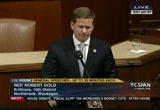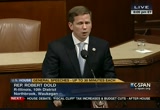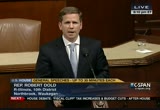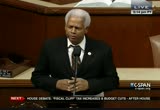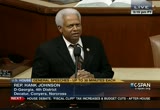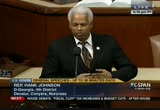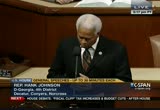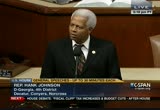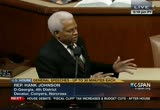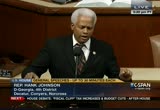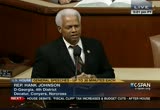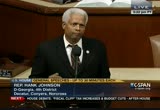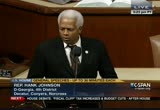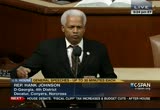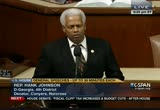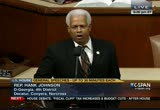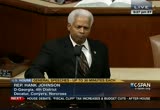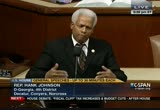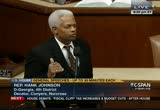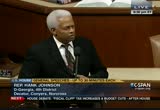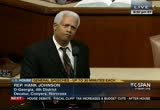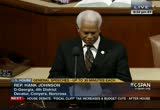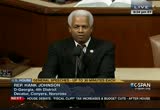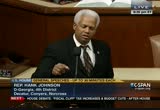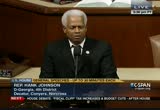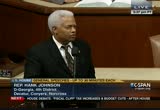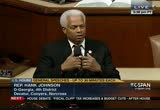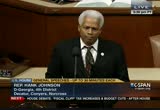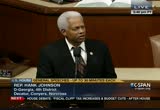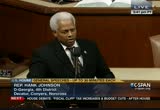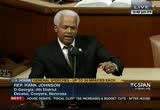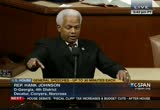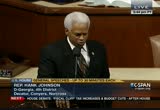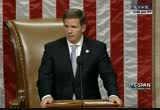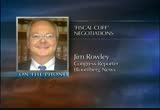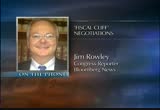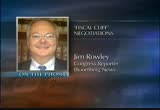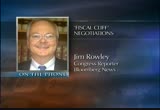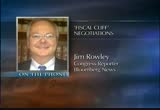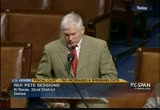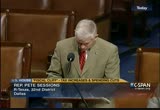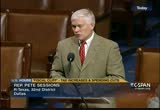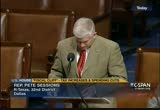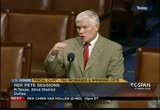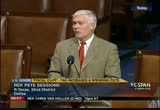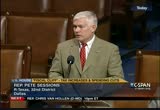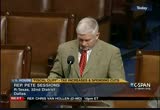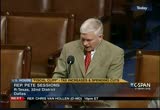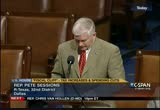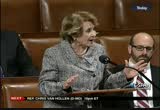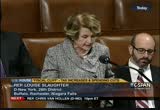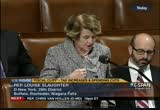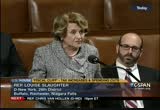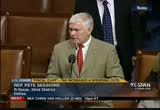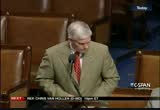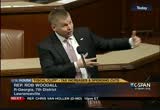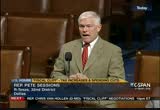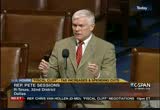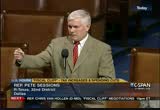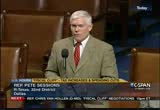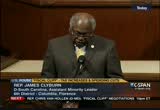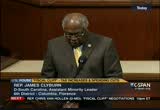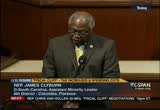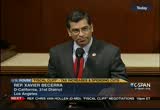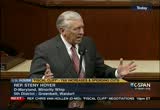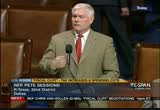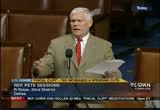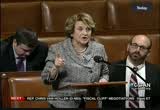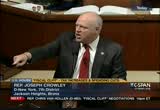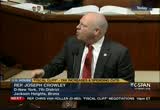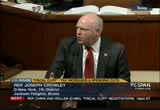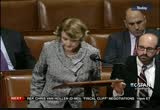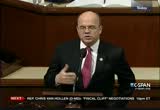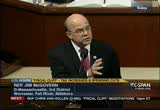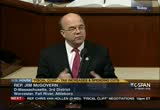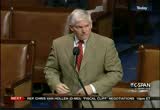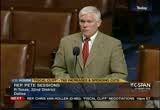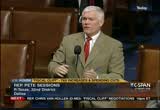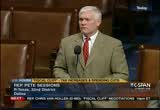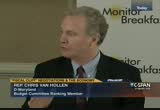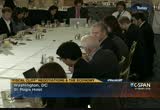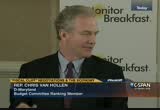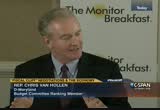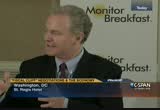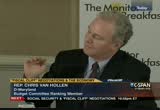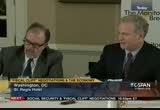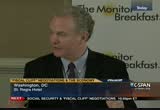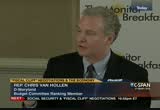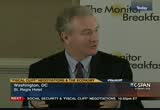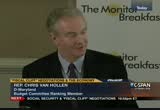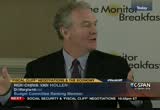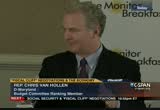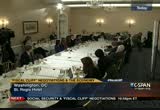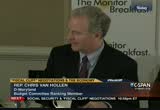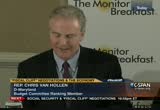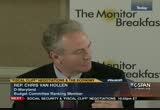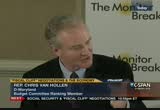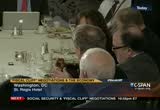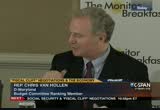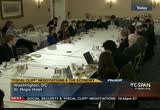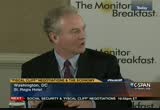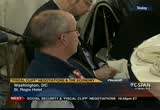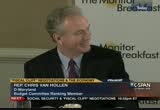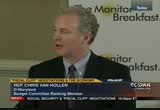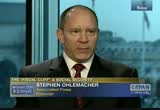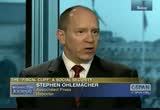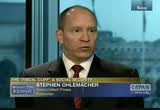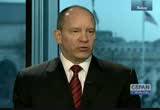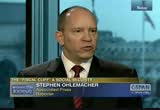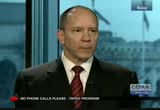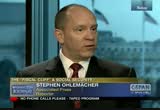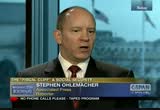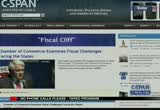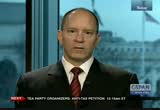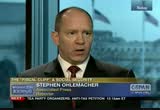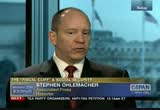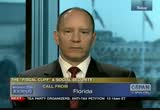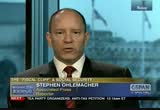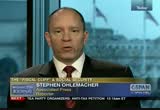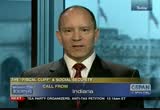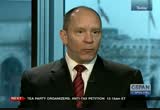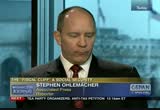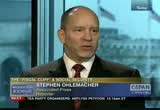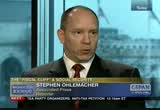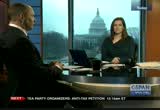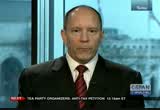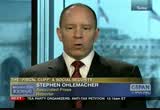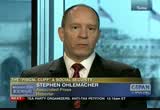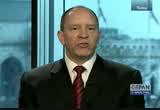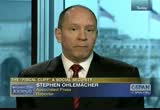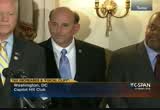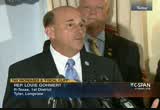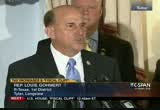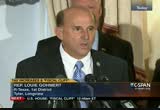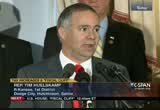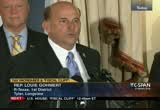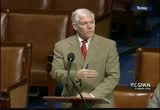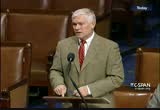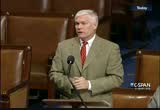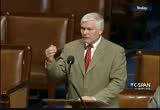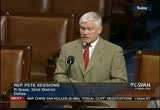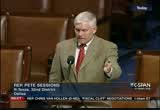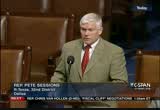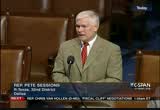tv Capitol Hill Hearings CSPAN December 12, 2012 8:00pm-1:00am EST
8:00 pm
that this will better help small businesses compete and create additional jobs. we also heard from many small business owners like rick wallenberg on the need to repeal the expensive and burdensome 1099 provision which would have placed another unnecessary burden on small businesses. i was proud to get behind this issue early on and was a co-spon or of the legislation and -- co-sponsor of the legislation and saw its passage. and somethingle we heard from workers and employers is payroll tax relief. i proposed this in legislation of my own and i was pleased to support it in a different piece of legislation, to put more money into the pockets of hard working americans. . this developed into my main street jobs agenda. it's focused on pro-growth tax reform, increasing exports in
8:01 pm
manufacturing, access to capital for small businesses, making investments in infrastructure, utilizing domestic energy resources, stem education and implementing smarter regulations. i believe, mr. speaker, that this remains the best recipe for getting our country back to work. beyond our job creation efforts, i'm proud of our leadership on confronting the nation's debt crisis. though not always popular, i refuse to accept the status quo of no budgeting, skyrocketing debt and ignoring the problem which only makes it worse. with over 40 cents now borrowed on every dollar spent by the federal government, this is both a current crisis and a future one as well. last year alone, we spent more paying the interest on the debt than we spent on domestic priorities of education, transportation and natural
8:02 pm
resource protection combined. this is unsustainable. this is why i have dedicated much of my time and effort of reining in spending and -- in washington. i'm proud of our efforts to introduce the first bipartisan budget in a generation. i want to thank steve latourette and jim cooper for their efforts and leadership on this. i also want to thank congressman quigley to co-sponsor and advance this legislation, which is based on the bipartisan simpson-bowles framework. this budget ultimately failed to pass the house, but i remain proud of our bipartisan effort for which the u.s.a. today called us the brave 38. and i believe this type of thoughtful independent leadership that this is the type of leadership that the 10th district deserves. i also believe that the courage and leadership shown by the
8:03 pm
house to take on the difficult, but necessary position of reining entitlement spending deserves recognition. we know that medicare stands out as a primary driver of our debt in the future. and unfortunately, this future is not so far off. with one of medicare's key programs scheduled to go bankrupt in the next 10 to 12 years, sustaining the status quo means dramatic cuts down the road on the vulnerable americans who need the program the most, crippling increases to the debt and most likely both. instead, i believe we have a generational obligation to ensure that our children's potential is not crossed by a debt burden borne out of the inability to govern responsebly. medicare reform requires broad bipartisan support so we are not there yet. we are not. i do want to express my appreciation to democratic
8:04 pm
senator ron wyden and chairman paul ryan for recognizing that a solution must be found to get this country on stable ground. we as americans must applaud and encourage bipartisan solutions. we must strengthen our social safety net and ensure its long-term viability. of course, getting our debt under control impacts more than what we do domestically. it impacts to protect our homeland safe and free and empower leadership on the international stage. the 10th district has a history and tradition of thoughtful global outlook and a special appreciation for the positive role american leadership can and must play in the world. this is a responsibility that i fully embraced and advanced. i have been honored to work with the ar menian community --
8:05 pm
armenian community here in this congress and i thank ken and all the people at all saints church and the armenian cultural center for their support in educating me about their committee issues and concerns. i also want to recognize the bahai community in the 10th district which helped me build support to recognize the atrocities of the people persecuted in iran. we put together an advisory board to speak out about the mistreatment of religious communities in bangladesh and human rights abuses taking place in africa. i think for the help with regard to this area. and we also focused on human rights and democracy promotion
8:06 pm
inside iran, but our work did not stop there. mr. speaker, in my very first speech on this house floor, i said that iran posed the number one security threat to the united states. and thanks to the advice and counsel of so many good people in the 10th district of illinois, community leaders like sandy perl, steve shapiro, janet cohen, the carvers, richard stein, steve lavin, rabbi victor wise berg, mark sax and so many more, thanks to their passion we continue to work on preventing this iranian regime from acquiring a nuclear weapons capability. we advance many measures in this congress and i'm pleased to have
8:07 pm
the opportunity to act as a leading voice and a champion in congress for strengthening the sanctions on iran. so much energy has gone into these efforts, not just from me but from many members and i will continue to urge that the united states ratchet up the pressure on iran's nuclear ambitions until the threat is affirmatively and effectively dismantled. another focus of mine has been finding ways to strengthen the u.s.-israel relationship, whether it has been delivering speeches from the floor of the house chamber, drafting and introducing resolutions affirming israel's right to a secure border, traveling to israel and meeting with israeli officials, authoring letters and recruiting members to sign on and support such as the early effort we led to fully fund our foreign aid to israel, including iron dome in a tough budget climate or co-sponsoring critical legislation.
8:08 pm
i have looked to provide true leadership in support of israel's long-term security. finally, i have looked to provide the 10th district with thoughtful and independent leadership in congress which it has had and i believe deserves. our district is bound by deep-rooted characteristics, a desire for effective leadership, vigorous independence and the ability to work with one side of the aisle -- with the other side of the aisle in a civilized and bipartisan manner. on this, i would like to recognize my two most recent predecessors, senator mark kirk and john porter. these man have served as mentors and friends. and i have worked to carry on a proud legacy that they have earned us for the 10th district. they have helped me in ways greater than they will ever know and i'm deeply honored to
8:09 pm
consider them as friends. they care deeply about the people of the 10th district of illinois. who they are and what they have achieved is reflected in the appreciation that our area still has for these two incredible men. they set the standard by which the 10th district leadership is measured and i cannot thank them enough. the thoughtful leadership are the same virtues i pledged to advance. and i'm proud to stand here today and say that i believe i have made good on this commitment. on a number of issues arranging from the environment, education, stem cell research, title 10 funding and women's health, gun control and transportation infrastructure, i have never been afraid to break from my party and do what i believe is best for my constituents and my district. this is why i have been ranked and considered as one of the most independent and most
8:10 pm
bipartisan members of this body. mr. speaker, as an eagle scout, my scout masters taught me to respect and love the outdoors, which is why i especially want to highlight our work to protect lake michigan. beginning with the first bill i introduced in the house, the great lakes water protection act, along with my good friends, i'm proud of our efforts to keep lake michigan clean. this legislation would prohibit waste water pollution from running into the great lakes, but our work to protect the 10th district's most cherished natural resource did not stop there. we focused on in supporting great lakes initiative through authoring and supporting funding amendments and advocating its importance, all to make sure this important program to
8:11 pm
protect the great lakes is adequately funded. i'm proud we have been able to facilitate the cleanup of waukegan harbor. it has finally started under our watch. so much work in getting this accomplished has happened and i want to thank suesey and jerry and cam for their dedicated service for cleaning up the harbor. getting finally lake county's pathway to the great lakes. i also want to highlight another cause which i have been proud to champion and that is stem education, science, technology, engineering and math, these are critical educational fields that we need to make sure our young students are not only exposed to, but have the tools to excel and compete in the global marketplace. this means giving these core
8:12 pm
areas extra attention and i would like to highlight the great work and dedication that dr. lopez has given. as a principal, dr. lopez is ahead of the curve in advancing stem education. among his students and a model for students around the country. he has helped me greatly and taken on the task of heading up my educational advisory board and i'm grateful. in closing, it has been one of the greatest honors of my life to represent the people of the 10th congressional district. i have never forgotten where i came from and what i came here to accomplish and the importance of governing for the people. and while i'll miss many things, mr. speaker, i will miss many friends i have made on both sides of the aisle and my dedicated and talented staff, some of which are here this evening, eric, my chief. kelly, kim, david, chris, eric,
8:13 pm
eric, daniel, stephanie, mike, jack and brian. they all worked tirelessly for the constituents of the 10th district and i'm proud to call them my friends. mr. speaker, i look forward to seeing this next congress address some big things, some big issues, because there is simply too much at stake. as i think about our nation's future, i'm reminded of a winston churchill quote, success is not final. failure is not fatal, but it is the courage to continue that counts. each congress brings a new opportunity to write the next chapter in america and america's exceptional story, but we must always remember that nothing is given. america's greatness must
8:14 pm
continue to be earned. our nation has built generation by generation through hard work and resiliencey of the american people and our generation must do our part to live up to this awesome responsibility. we must be a country that stands for freedom and liberty, economic growth and opportunity for every american and i remain optimistic that we can continue to make this country even better if we stay committed to these principles. mr. speaker, i want to thank the people of the 10th district for the opportunity and honor to represent them in the united states congress. the speaker pro tempore: the gentleman yields back the balance of his time. under the speaker's announced policy of january 5, 2011, the chair recognizes the gentleman from georgia, mr. johnson, for 30 minutes. mr. johnson: thank you, mr. speaker. mr. speaker, i was thinking to myself earlier this day, what
8:15 pm
happens when you put in a cage fight a giant in with a midget where the midget will not win the fight, i'm going to tell you that. why? it just doesn't carry enough weight to do so. but if you put 30 midgets in with that giant, then the midgets have a chance. now they have weight classes in cage fighting, so you're not going to find a situation where you have two or three against one. you'll just have equal weights. you will have equally-weighted combatants and then they will go
8:16 pm
at each other and then the best man will win, or woman. . but we don't have that kind of setup when it comes to relationships between employers and employees. there are no weight classes. so what generally happens is whoever is paying the workers is usually the giant. and so giants are in business to make a profit. that's how they became big and muscular. but they need those midgets. they need the digits out there, they need the workers to actually produce the goods or
8:17 pm
service that is traded in return for the money. which strengthens the the giant. so in an employment relationship, employer-employee, you've got the giant, you've got the midget. because there are in weight classes in that situation, you have an inherent imbalance. whoever has the most money has the most clout. they can give you a job or they can decide that they don't want to hire you. that's not your call. you don't have a right to work. you can offer yourself out for employment. but you don't have a right to work. so with no weight classes in
8:18 pm
this employment relationship where the employer is the giant, and the worker is the midget, how do you go about making it a fair fight? well, that's where you put the midgets together, you put 30 midgets in with the giant and the minlts then have a chance, collectively, and so that is how the situation has unfolded here in america.
8:19 pm
75 years ago, almost 75 years ago, congress passed the national labor relations act. which helps to protect american workers' rights to organize and negotiate the terms of employment with corporations. the minlts get a chance to speak with one voice -- the midgets get a chance to speak with one voice to the giants. the midgets collectively have the ability to stand somewhat equally to the giant. they have a possibility of winning. it's never going to be an employee win everything and
8:20 pm
employer goes down in defeat. no. the thing is, the workers get together, the midgets get together to try to get as strong as they can so that they can then deal with that giant in a more productive way. and the giant, wanting to to avoid the fight, decides to speak eye to eye with the midgets, with the workers, and work it out to where everybody can win. that's what it's all about. so the national labor relations act which protected american workers' rights to organize and negotiate the terms of employment, this actually leveled the playing field
8:21 pm
between the giant and the midget. leveled the playing field. now how was it set up that the collective body of workers could stand together and negotiate fair wages and fair employment conditions? things like paid holidays. things like health care benefits. things like retirement. things like number of days off. it just -- things like how much do you make? pay? so workers stood together, they
8:22 pm
had the ability to stand together and they were protected by federal law in standing together to be able to bargain with the mighty giant, the employer, to bring about some equity and a balance to that inherently unfair relationship. i won't say unfair but inherently unbalanced, out of balance, relationship. so pass that law, been working well almost 75 years but ladies and gentlemen, in the course of just seven days, what has happened in michigan is a blow to crush unions, crush
8:23 pm
collective bargaining, and to crush the power of individual workers to stand together, pool their resources, so that they can support public policy workers, in other words, politicians, so that they could support those politicians who support their interests. it's been working that way for almost 75 years, during that time we went from a nation where so many people were in poverty, lived in poverty, had no benefits, made slave wages, worked 20 hours a day.
8:24 pm
went from that kind of situation into where most workers were -- had attained middle class status, where workers could afford to go out, buy the house, buy the two cars, send the kids to college and take a vacation. and have nice clothes and all of the things that middle class people want. that's what the union movement produced for america by leveling -- by being in a strong position to be able to demand fairness and equity from the employer.
8:25 pm
so the employers, let's say general motors, ford, chrysler, the automobile manufacturers, since we're talking about michigan, they all made lots of money. and the workers who worked for those companies were middle class and their children went to college and became lawyers and doctors and accountants and some of them even went back to work in the factories. but now, seven days it took to crush the ability of workers to stand together financially. they'll never crush the spirit of the workers but they have
8:26 pm
used the law with no public hearings new york committee action, no regular course of action during the legislation, during the legislative session, which is a lame duck legislative session by the way, no regular order, just a sneak attack thursday morning, the sixth of november, one month after the landslide election in michigan and throughout this country, that turned back the corporate money that was arrayed against the democrats. and arrayed against president obama. it turned that back. a resounding victory on november 6, on december 6, a sneak attack
8:27 pm
while during a lame duck session with no public hearings, no committee action, sneak attack. they announced it that morning, thursday morning. the sixth. and by 8:00 p.m. action to pass crush the union laws have passed to -- have passed both houses, house and senate, in michigan. less than 10 hours. it took to bing down 75 years of prosperity for all. now why would anyone want to crush the union and i'm not calling them right-to-work laws because as i told you earlier, there is no right to work. so let's get rid of that
8:28 pm
misnomer, and let's call it what it is. it's not right to work legislation, it's crush the union legislation. who would want to crush the unions? it certainly wouldn't be the union members themselves. it must be by process of elimination the folks they work for. now in michigan, who do they work for, or who did they work for? they used to work for g.m. and ford and chrysler but due to all of those hefty bonuses and corporate greed that consumed the corporate leaders they were so busy getting those bonuses
8:29 pm
and million dollar bonuses every year, multimillion dollar bonuses in salaries and what not, that they took their hand off of the wheel and they allowed competition from foreign auto makers to overtake their competitive position. and so as a result, they ended up needing a bailout. ford didn't need a bailout. they went and borrowed some money. they did it the right way. and they also did some things to make their business more competitive in terms of the products. and so they were able to weather the storm without a government bailout but chrysler and general motors took money from the people to be able to sustain
8:30 pm
themselves. they were both corporations -- both corporations were close to being crushed themselves. and the workers would have gone down with them. so we did the right thing here and we provided funds to bail out g.m. and ford, excuse me, g.m. and chrysler and as a result of that, and as a result of the workers' union, getting together with the fallen giant to help pick that giant back up, what they did was they reached a deal, they cut back on some of the vacation days and some of the benefits, they lowered the
8:31 pm
wages. they did a lot to pick the giant up. . giant was awakened and ended up getting back on his feet. and now general motors, chrysler -- general motors has become once again the number one automobile manufacturer in the world. that shows you how -- that shows you the american spirit. and it was those workers who were instrumental in making it happen. where were the auto manufacturers on december 6? where were they?
8:32 pm
well, i have seen reports that say well, they are just kind of staying in the background and, you know, but they really don't support this legislative effort to crush the unions. they say that we don't really need that right now, but there's no one from the company getting up in the microphone and saying, don't pass this law. this is wrong. governor, don't sign this law. in the absence of any manifestations of support for the workers, i've got to suspect that general motors, chrysler, ford are feeling pretty good
8:33 pm
about how things worked out so far. in the absence of someone telling me different, i've got to believe that they sigh where that level playing field has now been tilted in their favor and they stand to -- despite the fact that the midgets helped them up, helped them get up when they have fallen, now they are going to crush the midgets. that's what it looks like to me. especially when i think back on this organization which is known as alec -- i always -- alec is the association of legislative
8:34 pm
-- the association -- the american legislative exchange council, i'm sorry, that's alec. american legislative exchange council. when i think back on the history of that organization and when i ponder who their corporate members have been, i'm brought to the realization that those auto manufacturers are long time members of alec. now what is alec? alec is an organization that brings public officials, mainly state legislators, together for quarterly meetings at various
8:35 pm
locations throughout the country. so the legislators, about 80% of the state legislators in america, belong to alec. and so they pay dues -- used to be $50 a year, now i understand it's $100. you pay dues. the citizens actually pay the dues for the politicians. that comes out of the state treasury. so they go, they join alec and they go to the quarterly meetings and they participate in the legislative efforts of that organization. which also includes, in addition
8:36 pm
to legislators, corporations, big business. some small businesses. but it's basically an organization of big business. they wished they could pay only $100. they might pay $25,000 or more for a year as a member of alec. so you have corporate members. you've got legislators who are members. you have individuals. and you got corporations. you got midgets against giants or not against giants, but with giants in alec. and the giants take real good care of the midgets as long as
8:37 pm
the midgets do what the giants want them to do. what am i talking about? at these quarterly events, the legislators are invited as well as the representatives of the corporate interests. they come together. they talk about the concerns of the business community, the business community has the legislators there who make the laws, so they talk to those legislators and they are being wined and dined the whole time. and you are able as a legislator, to join a committee of alec. that committee could be the public safety committee. it could be the committee that
8:38 pm
deals with voting issues. it could be the criminal justice committee. now why would alec be involved in criminal justice? well, you have private prisons, private prison industry is booming. they are members of alec. they get those captive legislators to introduce bills or legislation such as, let's say -- let's target the undocumented immigrants. let's target them and create some state laws and federal laws also to make it convenient, make
8:39 pm
it attractive for law enforcement to go in there and bring those folks to the private detention center and house them down there and pay them government money, $70, $80 a bid. why would alec have a committee dealing with voting rights? well, to produce legislation that makes it more difficult for people who support -- the opposition, make it easy to deny those folks their right to vote. and so you have those voter expression laws that came out of
8:40 pm
-- suppression laws that came out of alec. and then you have the commerce committee, let's call it, of alec. and they produce legislation such as crush the union legislation, also misnamed right to work legislation. it's not right to work, it's crush the union. so the bill or the bills that have been passed out of the michigan assembly in both their house and senate are products of alec, the association -- the american legislative exchange council. almost word for word.
8:41 pm
i challenge anyone to go look at -- go look on the internet, go look at, if you will, go look up p.r.o.-watch, prowatch.org go there and put in the words alec in their search button. go there and find out about alec. find out -- go look at the draft legislation that was plused by the corporations are -- who are
8:42 pm
members of alec which were up there dining and wining the legislators. the legislators then went back home and introduced that legislation which benefits the very corporations that wined and dined them and gave them the legislation. and guess what? those corporations, pursuant to citizens united can participate in the campaign process. they can do elections and influence elections, they can give money to organizations that support candidates. and so it's an ugly lobbying situation when you put corporations with legislators in a wining and dining setting with
8:43 pm
the added benefit of campaign contributions. they can't lose. that's what alec is all about, is putting legislators with businesses and then those legislators who tend to be republican, then carry out the wishes of the big business. who suffers? the middle class. so just 30 days after the middle class -- the people ruled the day, we still have alec and the corporations that fund it out there trying to destroy the middle class, by crushing the unions. how do they crush the unions? because they know the union doesn't have a situation like
8:44 pm
alec where you're putting the legislator with the corporation or the corporate interests. you are putting them together and you are wining and dining the legislators and you are also pushing your legislation on them . and as an added bonus, you are giving them campaign contributions so they can get re-elected. you got it going on. unions don't have that kind of setup. there is no alec of unions. so -- but unions do participate in the political process. they get behind candidates who support working people. i see my time has come to an end. and i would love to discuss this
8:45 pm
more. in fact, i believe that i will, because this time last year, i was on the floor for an hour talking about the koch brothers. i want so much to be able to bring the koch brothers into this discussion to see how karl rove going into this equation going back to the pow well memo. we will be back and talk about those things as soon as possible. thank you very much. the speaker pro tempore: the gentleman's time has expired.
8:46 pm
8:47 pm
those opposed, no. the ayes have it. the ayes have it. motion is adopted. accordingly the house stands adjourned >> the house as i adjourned -- the house has an adjourned and will return tomorrow at 9 a.m. eastern. >> a congress reporter for bloomberg news joining us from capitol hill. democrats keep pressing
8:48 pm
republicans to take this bill to the house floor. what is the status to vote on the measure? >> they have several hundred signatures, we were told. we are told that some people do not like to sign discharge decisions, would -- but would support a bill if they came to the floor. >> word is that the bush tax cuts seems to be one of the most important points between house republicans and president obama. who wants what? >> they want both houses to pass the middle-class tax cuts. there is a senate bill under the house house were to pass it, it would go right to the resident's desk for a -- president's desk for a signature.
8:49 pm
they want a commitment to do entitlement reform. they will not give on that particular issue. >> speaker boehner says he is preparing his members to work throughout christmas. do you think this'll come to fruition? >> i think it is likely we will be in session between christmas and new year's to resolve this. i think the speaker has to go the extra mile for his conference. it may be too soon to reach a deal with the president. >> there has been a flurry of back-and-forth calls of negotiations is chain the president and speaker boehner. any indication on progress? >> at this point, they are drawing lines in the stands. -- sand. it does not like anyone goes into a room and discusses anything.
8:50 pm
the parameters are shifting ever so slightly. at some point they will have to talk about what they will put in the deal. we are a ways off from that. >> in speeches and briefings, republicans have made a point that they are speaking specificity from the president on spending cuts that he would like to see. have they seen anything specific? >> the president is not offering specifics. his spending cuts are contained in the 20 13 budget proposals -- 2013 budget proposals he sent to congress last march or february. it contains $350 billion in medicare and some medicaid savings. republicans say that is inefficient. the democrats have responded that spending cuts are what republicans want, so they should
8:51 pm
therefore put forth their own proposals about what they specifically want. steny hoyer said that republicans do not want to take responsibility for offering specific cuts to programs like medicare. >> what are you watching closely? what do suggest that c-span audiences watch closer question mark -- poster? -- closer? >> the house speaker with careful last week when he ruled out a smaller tax hike and what would take place for the top 2% of earners in return for something that would protect small business operators from being hit by this. this is something he objects to. he did not say never. he said there are lots of ways to get the revenue that the president wants. >> jim rowley covers congress
8:52 pm
for bloomberg news. thank you for joining us. >> my pleasure. >> house negotiations over a fix for the so-called fiscal cliff continues in washington. house members talked on the floor on a resolution that would take measures. it begins with a texas republican. this is just over an hour. mr. sessions: thank you very much, mr. speaker. for the purpose of debate only, i yield the customary 30 minutes to the gentlewoman from fair point, new york, my dear friend, the ranking member on the committee, ms. slaughter, pending which i yield myself such time as i may consume. the speaker pro tempore: the gentleman is recognized. mr. sessions: thank you very much. during consideration of this resolution, all time is yielded for the purpose of debate only. mr. speaker, i ask unanimous consent that all members may have five legislative days to revise and extend their remarks. the speaker pro tempore: without objection. mr. sessions: i rise today in
8:53 pm
support of this rule which will provide this body the ability to consider legislation under suspension of the rules for the remainder of this congress. however, i would prefer not really to be here today talking about this resolution. i was speaking with the gentlewoman, ms. slaughter, a few minutes ago, that it concluded that it sounds a lot like christmas and that's why we're all here. it must be christmastime and so we're going to work all the way through. i'd like to be home with my constituents. i'd like to be home with the family. i'd like to be doing things, but the reality is that congress will have to remain in session for the holiday season because we're the ones that said we would help solve the problems of this country, that we would step up to the plate on behalf of the american people and make sure we did what we said we'd do and that is to make life better for people. we set the dates, we set the
8:54 pm
timing and that's why we're here. so while families all across the country are with their loved ones, we will be here working. we said we would, and what we're going to wait for is our two sides, our leaders, the president of the united states, barack obama, the speaker, john boehner, certainly senate majority leader harry leede, lead those efforts to find a legislative deal that is designed to avoid america and this country, including our government, from going off the fiscal cliff. we have heard a lot about that. we are speaking about it. we had discussions on the floor today about it. that's why we're here. and we're trying to make sure as we as members of congress from both parties are here trying to help resolve that, we can still do work in between that period of time. so two weeks ago house republicans proposed this solution of trying to make sure
8:55 pm
that we would have an answer, the president's come back with a solution and we now know where to point our friends, the democrats, are insisting upon a tax increase to move forward and republicans are saying, hold on. we need new revenue but we don't need new taxes. especially taxes on small business owners that are the creators of jobs in our economy. and so republicans are saying we're not going to fall victim for the republicans' ideas and democrats' ideas that destroy 700,000 american jobs. so here we are. we're here going to stay here in town. republicans have resolved to stay here. we said we'd sit at the table. we said we would do the american workers and the american people's bidding at the table to make sure we have a bipartisan answer and that's what we are going to do.
8:56 pm
so we all remember that following the election in november that our speaker, john boehner, committed that this body would continue working with the president to reach a compromise that averts the fiscal cliff. avoiding the fiscal cliff is what we should continue to do, and we should work very diligently. so for my friends that wonder why we're here, perhaps, mr. speaker, our families, we're here. we are going to keep working. we are going to work day in and day out and we're going to hope that the -- our leadership, including the president, is able to make counteroffers until we reach that exact point where a deal can be done. this is not just about negotiating. it is about finding an answer for the american people. by the way, for people that think this is all about politics and the things are going on, perhaps it is, but it's going to take both sides.
8:57 pm
two sides, two willing partners who are willing to come to an agreement, that's why we're still in town. to date i know we've not seen a lot of progress. i know we are all worried about it, but i would remind us and i believe this is true that the president said he's going to stay at the table, he's going to work with republicans, he's going to get a deal that's good for the american people, and the president said this during the election, and so i think we're here to make sure that is what happens. mr. speaker, less than 20 days in addition to the beginning of the new year, we're going to find out that we also have a new set of taxes that have already been agreed to by the congress. ms. pelosi, when she was speaker, the president, ran through something that the president likes to call obamacare, but there are massive taxes already ahead in law for the american people, many of which were just now
8:58 pm
becoming aware of. i guess that's what happens when you don't read the bill before you pass it. but every single american will see their personal taxes already go up, and that's before we get to whatever happens with the fiscal cliff. this is an arbitrary, across-the-board tax increase. the combination of which will mean that if we are unable to resolve the fiscal cliff without raising taxes, we'll already see a lot of new taxes as a result of the health care law on financial transactions, on insurance programs, on every single working american. so that's why we have our speaker, john boehner, trying to present president obama with an alternative that says rather than raising taxes which is already going to happen on january 1 from this massive new
8:59 pm
tax increase that was in the health care bill, why don't we find a way to understand and have the economy take that in hand first? i know the president stood here at the state of the union address and said we're not going to spend one dime of taxpayer money. i know the president stood here and said every single american can keep your own insurance plan. i know the president has made these promises to the american people and these are things that we're going to have to understand about january 1 next year. and i believe that's why we need to have john boehner be successful and the president to make sure we avoid further tax increases because we already have a massive tax increase that's going to take place. this would in essence be a double whammy, a double whammy on just a fragile economy but an economy that's in far worse shape with a country that's far more in debt and much more at
9:00 pm
risk today. so you and i understand, the c.b.o. has estimated some two million american jobs would be at risk because of the obamacare implementation and its massive impact on the free enterprise system and taxation combined with what would be this new, if the president gets his way, tax increase on working americans and in particular small business. so while much has been made about the debate surrounding tax rates there's i think a larger picture that we need to consider and we should focus on employment and jobs and we should focus instead of trying to necessarily aim for fairness just by using this weapon against small business, i think we should aim at job creation.
9:01 pm
we understand that if the president's bill passes we will lose 700,000 jobs. that means 700,000 americans and their families that would then qualify, i presume, for unemployment and would mean that we'd begin the new year once again on a negative pathway. that's why we are here today talking, trying to have our leaders of this great nation make sure that we avoid this. this country is in desperate need of an economic kick-start, and lower taxes, we believe, through stimulating job creation, job investment and by stimulating the economy will allow all americans not only to keep their job but also to keep more of their own hard-earned pay. in fact, president john f. kennedy i think agreed with us when he said it is a paradoxal
9:02 pm
truth that tax rates are too high and tax revenues are too low and the soundest way to increase revenues in the long run is to cut rates now. well, that's exactly where we are. republicans are arguing, let's not increase taxes at a time when the american economy is struggling, when families are struggling. let's not ask them to go into their pockets and pay more to a government who simply wants to spend more of this money. mr. speaker, my republican colleagues and i remain committed. we're committed to staying in washington, d.c. to try and get this done. and between now and then, what this rule is all about, and we're going to put us to work on solving some of the ideas and issues that remain in the work at place, where there are answers with suspension votes and so that's why we're here today, pending conference reports and decisions that need
9:03 pm
to be made. so i encourage my colleagues to support this rule with a yes vote, and i reserve the balance of my time. the speaker pro tempore: the gentleman reserves the balance of his time. the gentlelady from new york. ms. slaughter: good afternoon, mr. speaker, and i do want to thank my true and good friend, mr. sessions, for yielding his time. i want to congratulate him on being chair of the rules committee, and i look forward to working with him. i think, though, what we want to do this morning is perhaps debate the health care bill one more time. it's not enough that this house in the last term debated 32 times at least to try to repeal all or part of it, and we know that not a single person on the other side voted for that bill, but if it gets more and more popular in the united states i think sooner or later they'll wish that they had. i do need one comment i need to make before i get to the business at hand and that is the notion always that it was rammed through in the middle of the night. the health care bill went through the entire committee process. there are pieces in there that republican members of the committee put in although they
9:04 pm
may not want to admit it, but they're there. in addition, the democratic caucus, under the leadership of nancy pelosi, went over that bill line by line three times. i remember it well. but let me get to the business at hand because, mr. speaker, i haven't seen an honest day's work in congress here in quite a while. earlier this year, a broadcastering company said it reported $320,000 a week to run the house of representatives, but the majority spent the money on shuttling us back and forth to washington and ask us to sit here and twiddle our thumbs. no more. it's time to get down to brass tax and give the american people a return on their multimillion dollar investment. we start here and now by passing the middle class tax cut. all we have to do is take up a
9:05 pm
senate bill. it's right there. noigs that we ought to really take up the violence against women act from the senate. not the house bill. the house bill did not include numbers of women in america under this act, native american women, gay women, immigrant women and we couldn't tolerate that. let's take the senate bill and pass it that bill has reduced domestic violence 67%. we need to reduce it 100%. but we cannot do with that -- without that. the farm bill spornt. look at some more of that but we need absolutely, i cannot say it enough, soing many people this morning made that point clear, we can and i know that numbers of republicans want to do this in a bipartisan way, we can do what we've already agreed on that is that the middle class should not have a tax increase but that the rich every people in this
9:06 pm
clint, that's what the country was founded on, should be paying their fair share. and there's simply no reason for this delay. once those tax cuts are passed andy can move on to countless other issues i've already mentioned that demand our attention. we can extend unemployment insurance. it's set to expire on january 1. it will affect millions and certainly affect our economy. we can give support to millions of americans struggling to recover from hurricane sandy wefment can begin an open debate as i said on the violence against women act. historians have said that this term of congress, these last two years, have been the least productive in american history. that is not anything to be proud of but the majority seems to be intent to keep that title. they spent two years taking vote after vote to repeal health care and even more time to make sure that the $4 billion subsidy to the big oil companies stays intact. it's shames will and we need to do more than that.
9:07 pm
the people who sent us here deserve more than that we should not be crying out in the wilderness to work, we have been sent here to work and we need to get down to it. in the final hours of this congress and we have the threat of working christmas, if we have to do it to get things done, i'm willing to do that, but the majority should help solve the nation's most pressing issue, that's why we're here. do not actively choose to leave the work unfinished. as we silt and wait for gos on the fissclaldeliff, the other -- there is other legislation that's ready that could be done now, could help our markets, relieve the mind of employer, could give security to the middle class and people below that and we certainly ought to be doing it. today's rule simply does the following. all we're doing now at this minute is we're giving the majority the freedom to spend the rest of this month and the rest of this year on minor,
9:08 pm
noncontroversial legislation. i refuse to give this blank check to a majority that has yet to show any interest in completing the outstanding work. i urge my colleagues to join me in opposing today's rule so we can try to get back to d -- get back to work. today should be the day, this wednesday, very day, should be the day that we start doing our job to provide real solutions to those with real problems of those we represent and i reserve the balance of my time. the speaker pro tempore: the gentlelady from new york reserves. the gentleman from texas. mr. sessions: thank you very much. the gentlewoman makes a number of good points -- points. we did pass in the house the violence against women act that passed may 16 of this year, 222-205. the house has passed, by the way, 256 of our colleagues to 171 what's tchailed job protection recession prevention act and it was passed on august
9:09 pm
-- ms. slaughter: will the gentleman yield? mr. sessions: i will in a second. it would have extended all current rates and compelled congress to enact meaningful tax reform in 2013. we passed this. we said we ought to do what we should do. and that was back in august and i would yield to the gentlewoman. ms. slaughter: i thank you, mr. sessions. i know you, i know that you understand, i've talked about this, but that bill that passed this house excluded a large number of the women basically what this house said with that vote was go ahead and beat them up. we don't want them covered. after the election, after what everybody has been through after what the american public thinks about what large number of our cohorts believe here, surely to goodness you would not recommend that that bill become the life of the land. mr. sessions: reclaiming my time -- ms. slaughter: we are asking to take up the senate bill that covers all women.
9:10 pm
mr. sessions: reclaiming my time. appreciating the gentlewoman, we'll be engaged in these debates, have been in the past and will be in the future. i think the gentlewoman makes a good point. we offered this bill, debate it, passed it, we're waiting for the senate to get to the point where we can get to conference. that's how this thing works. we're not going to take the senate bill and pass it, we passed our bill. if we can get conference where the senate and house get together and they resolve the differences, then we can bring it back and we'll have a bill. that's supposed to be how this place works. it's not where we pass our bill and then all of a sudden we decide we're just going to take the senate bill and repass it and negotiate with ourselves. i think what we need to do is stick to what we understand and that is that we're waiting for the senate to come and do business with us. mr. speaker, at this time, i would like to yield five minutes to a young new member of the rules committee, the gentleman from georgia, mr.
9:11 pm
woodall. the speaker pro tempore: the gentleman is recognized for five minutes. mr. woodall: thank you, mr. speaker. i thank the gentleman from texas for yielding. he'll be our chairman next year, i'm looking forward to his leadership. we're setting the tone for what's going to happen next year. i said all through the fall, mr. speaker that this was going to be that opportunity we were going to have to kind of define where this congress was going to go for the next two years. i say to my friend from new york for whom i have great respect and who i have enjoyed working with on the rule committees for two years, mr. speaker, that this rule today does exactly what my constituents back home have asked me to come back to washington to do. the gentlelady cited bill after bill after bill that i have been proud to support to try to rip the president's health care bill out by its roots. we have worked hard on that the senate hasn't cooperated with us, the president hasn't cooperated with us, so we
9:12 pm
weren't able to get that done. this bill says let's move beyond the controversial topics, let's move beyond the topics we know we could jam through. there's a republican majority, we could yam through any piece of legislation we wanted to jam through. but this rule says this is not the way to finish out this year. this rule says we need to grab each piece of legislation that has bipartisan support, grab each piece of legislation that folks have been laboring on for two years, they've brought together a consensus around and let's pass those things. i think that's fantastic. i think that's fantastic that every single bill members have been investing their energy in, they've been able to -- they'll now have a chance to move to the floor. my frustration is, what about the bills we've already worked on here in a bipartisan way that have yet to be taken up on the senate side? i heard from think constituents in a town hall meeting last night, they said why do you always put everything off until
9:13 pm
the last minute? why didn't you deal with the sequester earlier in i said, you mean like back in may when the u.s. house passed the only sequester replacement bill to be passed in this town. back in may. they said maybe that takes care of the sequester problem. think said what about the tax rates? i said what about in august new york a bipartisan way, we passed a bill, in this house, to extend current tax rates, to prevent tax rates from going up. i took another question from up with of the folks who said, but what about that senate bill people keep talking about? what about the senate bill? why won't that get a vote in the house. i said actually quite unusual in the rules committee you don't see it often but rules committee waived all the points of order, took all the roadblocks out of the way, in an unprecedented way to allow what we called the levin amendment, which was basically exactly the plan the president
9:14 pm
has been pushing, to raise toongs family-owned businesses, to punish job creator well, took that vote on the house floor. i'm proud to say that again in a bipartisan way republicans and democrats came together, rejected class warfare and said let's get behind a program that expands the economy for everyone. and we passed that tax bill back in august. then again in september. worried about this defense sequester that's coming up, we took up the bill from the gentleman from florida to say how can we deal with these defense sequestrations in a responsible way? i go back to may when this house did its work, i go back to august when the house did its work. i go back to september. there is proposal after proposal after proposal that as the gentleman from texas said, we could take to conference tomorrow. and if i could ask the gentleman from texas because you know better than i, i know this rule allows for suspensions to come to the floor but what about that? what about when the senate decides to get to work and
9:15 pm
takes up the companion legislation and the bills we passed in the house will we be able to move to go to conference here in the body? mr. sessions: i appreciate the gentleman engaging me, there is nothing in this rule to preclude us taking a conference report or any business on what we might call regular order that would require a rule to come forth. mr. woodall: the gentlelady talked about important pieces of legislation coming to floor, if the house appoints conferees and the senate appoints conquer foo -- confer quees, we could bring every piece of legislation to come back to the house that she has on her agenda. mr. sessions: the gentleman is correct and we expect those. mr. woodall: this is the kind of house, deliberative house, i came to be part of two short years ago. we have the ability to get these things done in the next few days. i reject the idea that i read over and over again that this house has been delaying action
9:16 pm
this house got it right wetch got it right in a budget in april of 2011, we got it right in our budget in 2012, we got it right when we passed aest sequester replacement and we're getting it right with this rule today. with that, i yield back the balance of my time. the speaker pro tempore: the gentlelady from new york. ms. slaughter: i'm pleased to yield one minute to the gentlelady from california, our leader, ms. pelosi. the speaker pro tempore: the gentlelady is recognized for one minute. ms. pelosi: thank you very much, madam chair. ranking member. thank you, mr. speaker. why did i sort of smell smoke when i heard this debate? it's reminiscent of nero fiddling while rome burned. the american people are waiting for us to get the job dobe here, not to make a myriad of excuses about why stuff hasn't been done. you're bringing up a rule that says we should take -- have
9:17 pm
suspension authority. let's bring the middle income tax cut up under suspension. i believe and i am willing to take the chance that this house would give over 2/3 of a vote to middle income tax cuts. a tax cut which gives -- do i detect your smirk to mean you don't think republicans won't vote for middle income tax cuts? should i take it to mean you will continue to hold middle income tax cuts hosstanl, giving tax cuts to the wealthiest people in our country? the unfairness of it is appall, the fact that it increases the deficit is disgraceful. and that it does not change -- create jobs is a big mistake for us to make. what we are asking for in this rule is to say no to the
9:18 pm
previous question so that we can take up a rule that says that we cannot leave here until we -- until and unless we pass the middle income tax cut. whatever else happens on the whole myriad of other issues that relate to the cliff. this matters, what happens here. it matters that we get a job done. it is relevant to the lives of the american people. as we gather here, we, a country of great family traditions, of family values or of commitment to faith, faith in ourselves, our families and our god, our country, are away from home while people are lighting a menorah candle, a hanukkah candle, while people are trimming trees and the rest of that. ok, we're here to do our job but we we hear from the republican side that they might not be ready to relieve the
9:19 pm
pain and curiousity of the -- that the american families have about whether we're going to get this done. . whether the markets will have confidence how to grow the economy and create jobs and remove all doubt, remove all doubt in the full faith and credit in the united states of america. every time you come to this floor it's a question, why are we here? we are here to do the people's work. let's sit down. get it done. and move forward. instead of filling the agenda however worthy some of those initiatives may be, instead of not along with passing a middle income tax -- this is also reminiscent of a year ago. the president proposed, the house and senate, democrats and republicans, voted for the
9:20 pm
payroll tax holiday. the republicans in the house resisted. painted themselves into a corner until they had no choice. the issue had been made too hot for them to handle and they finally had to come around to supporting the payroll tax holiday. and here we are again. 100% of the american people will receive a tax cut when we pass the middle income tax cut. the wealthiest people in our country will receive a tax cut up to their income of $250,000. we are asking them to pay a little bit more for what they make over $250,000 a year. to help reduce the deficit, to help grow the economy, grow the economy. that growth is what is essential. you want to reduce the deficit, create jobs.
9:21 pm
why aren't we doing that? why aren't we just having all this subterfuge and this, that, and the other thing? why are we being told make a reservation christmas eve and one on the day after christmas to come back? is there not an appreciation for the jewish holidays, christmas holiday, kwanzaa, all the days families come around, bonding rituals, important to the strength of our society, do we not care about that? the american people do and they want to shop for it. they want to have family dinners and they want to exchange gifts as is the tradition, but they really don't know if they are going to be able to pay the bills in january that they -- for the purchases in december. the president has been very clear, democrats have agreed to $1.6 trillion in cuts.
9:22 pm
much of it voted on -- all of it voted on already either in the budget control act or in the -- other actions taken by this congress in the course of this congress. we have already taken up -- savings of over $1 trillion, redirected savings in medicare to prolong its life and to increase benefits. that would be a $700 billion in the affordable care act, and another another $400 billion in the president's budget. we are committed to that. where are the tax cuts? where are the tax cuts for the middle class that would inject demand into the economy and would therefore create jobs and create growth? where are the revenues that we
9:23 pm
would get if we did that and then had the additional participation of those who make over $250,000? where is the revenue that the republicans are willing to bring to the table? all we have seen from them is a letter. all we have heard from them is they don't want to tax the rich. all we know is that the public is very much onboard with everyone in our country paying his or her fair share. so this rule today that says give us authority to have other bills brought to the floor, well, one of those bills is the middle income tax cut, we are happy with that. but if that isn't the plan, then i urge my colleagues to vote no on the previous question because that will then enable us to bring a rule to the floor which calls for bringing forth the middle income tax cut before we
9:24 pm
leave here. again, we support the president and his proposal, which is fair, which reduces the deficit, which creates jobs, and which will work for the american people. with that i yield back the balance of my time. the speaker pro tempore: the gentlelady's time has expired. gentleman from texas. mr. session: thank you very much, mr. speaker. with great respect to my dear friend, the gentlewoman from san francisco, and the minority leader, i'm delighted that she came down to engage us on this very important issue. the gentlewoman does recognize and know that the house on august 1, in fact, did exactly what she has suggested that they, and that is to take action on what the future tax rates would be in this country. and on a bipartisan basis, 256 -171, this house of representatives said, let's understand that now is a bad
9:25 pm
time to raise taxes on the american people. and let's extend for a period of time all the tax cuts which allow america to keep working. we passed it 256-171. mr. speaker, i'd like to ask unanimous consent that i insert into the record a chart that exists on the house budget committee that shows the choice of the futures, and what future was presented, if i could -- thank you very much. this slide that i've got that's on the house budget committeele is essentially about the current pathway the president would choose as outlined in his budget that the gentlewoman, ms. pelosi, spoke of that got no
9:26 pm
votes in the united states senate. not one vote. no votes here. the plan that the president has presented which would substantially -- not just raise taxes but substantially raise spending, if you isolate the president's ideas of simply raising taxes on the -- whatever he calls the top 2% or those that have a household income of $250,000 and above, what you essentially do, mr. speaker, is very quickly lose 700,000 american jobs. and that's the answer that this administration fails to include in their talking points. that there is a huge impact. part of that impact, mr. speaker, comes from the problem where dividends, dividends, are
9:27 pm
those -- that money that comes back as a result of an investment, would rise essentially from 15% to whatever a person's top tax rate is. meaning it could go at least under the scenario that the president wants to 39%. that means from 15% to 39%, that window, that value in between, is what people reinvest in their companies. they reinvest that, many times, in small business, and that's the job creation element. when you make this rate go up, you arbitrarily take away some 700,000 american jobs that need current capital every day, a small business owner reputting that money, reinvesting that money for the life of their business. and this is the part that we
9:28 pm
believe, as republicans, that we stand on the side of saying we shouldn't lose american jobs just for the sake of fairness. of what the president, what the minority leader is now arguing for of increasing taxes. he so it's obvious to republicans that -- so it's obvious to republicans what we believe we stand for is creation of jobs and making sure that that capital that's invested in the economy continues. i reserve my time. the speaker pro tempore: the gentleman from texas reserves the time. the gentlelady from new york. ms. slaughter: mr. speaker, i'm pleased to yield three minutes to the gentleman from south carolina, the assistant democrat leader, mr. clyburn. the speaker pro tempore: the gentleman from south carolina is recognized for three minutes. mr. clyburn: thank you, mr. speaker. i request permission to revise and extend. the speaker pro tempore: without objection. mr. clyburn: i thank the gentlelady for yielding me this time. mr. speaker, when the so-called supercommittee failed last year to overcome the obstruction of the tea party republicans and
9:29 pm
their leader, grover norquist, to achieve a fair and balanced plan for deficit reduction, economic growth, and job creation it would take a decisive national election to settle the matter. i believe president obama's victory on november 6 was very decisive and pretty definitive. during the campaign president obama very clearly laid out his vision and the american people strongly affirmed his position. the president won all but one of the swing states. 62% of the electoral college, and carried the popular vote by more than 4.5 million votes. democrats added to our numbers in the house and senate, and captured the house popular vote by more than a million votes.
9:30 pm
in february of 2010, president obama began the process to reduce our deficit by establishing the simpson-bowles commission. since that time, many bipartisan groups have made recommendations on how to reduce the deficit. and they have all been in agreement. you need a balanced deal that requires shared sacrifice from all americans, including the wealthy. in 2011 we began to reduce the deficit, but we did it entirely through spending cuts. over $1.5 trillion and have asked nothing of the most fortunate. in 2012 the american people spoke. it is time for balance and
9:31 pm
shired sacrifice, and the first step is to allow -- shared sacrifice, and the first step is it to allow the bush tax cuts for income over $250,000, to expire. but that is bait for another day. now we must do what we agreed on . extend the tax cuts for everyone on their first $250,000 of income. the proposals put forth by the republicans since the election and their refusal to extend the middle class tax cuts, which we all agree should be extended, are just more of the same obstructionism. the time for posturing is over. it's time for house republicans to accept the express will of the american people and get beyond their pledge to a special interest lobbyist here in washington, d.c. although, frankly, i fail to see
9:32 pm
how avoiding to cut taxes violates the pledge to never raise taxes. we need to defeat the previous question. thank you. the speaker pro tempore: the gentleman from texas. mr. session: thank you, mr. speaker. mr. speaker, i'd like to remind the gentleman that the republicans have already passed the bill for the middle class tax cut on august 1 of this year and passed 256-171. we are now waiting for the senate to act on that. i reserve my time. the speaker pro tempore: the gentleman reserves his time. the gentlelady from new york. ms. slaughter: mr. speaker, i yield two minutes to the gentleman from california, the vice chairman of the democrat caucus, mr. becerra. the speaker pro tempore: the gentleman from california is recognized for two minutes. mr. becerra: i thank the gentlelady for yielding. if you're in the middle class, shouldn't it feel like you're in the middle of america?
9:33 pm
yet the politics of extremism is pushing the middle class to the very edge. the very edge. our house republican colleagues continue to ignore the calls from the american people to extend middle class tax cuts now . that politics of extremism is threatening to raise taxes on the middle class by the amount of about $2,200 starting january 1. republicans should once and for all join with democrats and the american public to bring the bipartisan senate-passed middle class tax cut bill to a vote on the house floor. . 97% of small businesses don't see a single tax increase next year. democrats and 2/3 of the
9:34 pm
american people agree with the growing number of republicans who are telling the republican colleagues, take the 98% deal. take the 98% deal. my friends, this is not the time to put the foot on the economic recovery that we're beginning to experience, foot on the brake of the economic recovery. it's time to get our work done. remember, colleagues, where we were four years ago. four years ago, november, 2008, our country was hemorrhaging 800,000 american jobs. this november, we got the news 146,000 new jobs. it's time to continue that progress. let's stop abide big pledges to special interests and start abiding by our pledge to the united states of america and the people who elected taos serve the interest of all americans not those of special interests.
9:35 pm
let's pass the middle class tax cut bill now. >> the -- the speaker pro tempore: the gentleman's time has expired. the gentleman from texas. mr. sessions: i'd like to just make sure that the speaker that was up here, mr. becerra, understands that on august 1 of this year, we passed a bill to extend tax cuts for the middle class. 256-171. we've done that. it's now awaiting senate approval. i reserve my time. the speaker pro tempore: the gentleman from massachusetts. >> i'd like to yield three minutes to the democratic whip, mr. hoyer. the speaker pro tempore: the gentleman is recognized for three mins. mr. hoyer: i ask unanimous consent to ethheth -- to revise and extend. the speaker pro tempore: the gentleman is recognized. mr. hoyer: i thank my friend for yielding, i want to thank the chairman of theule -- rules of -- rules committee for his efforts as well. ladies and gentlemen, we talked
9:36 pm
a lot, correctly, about creating certainty. alleviating uncertainty. alleviating angst among our people and among our economy. we have an opportunity to bring certainty to a large segment of american that -- segment of america that they will not receive a tax increase on january 1. we have that ability because the united states senate has acted on a bill which will allow us to do that. even if we don't take their bill up, we could take a bill that tim walz has introduced, congressman walz has introduced a bill which will say to the 98% that we've talked about you won't get a tax increase. i think that we have agreement on that across, as the gentleman from texas indicated, we have agreement on that i think there's not anybody here or very, very few at least, on
9:37 pm
either side of the aisle who doesn't say that those who are making $250,000 or less as families or $200,000 as individuals or less, shouldn't get a tax increase. now there are some who say that those above shouldn't get a tax increase either, i understand that, but we have disagreement on that the american people are frustrated by the fact that even that on which we have agreement we can't move. they understand we have policy differences. but they're hopeful that when at least we have agreement on an issue we can move it. if we did so, think of the confidence and mr. cole, former -- had your job as chairman of the campaign committee, said let's pass this. let's give the middle class, the working people of america a christmas present. a sense of certainty a sense of self-confidence, a sense of
9:38 pm
well being that would be good for our economy but certainly good for them individually and as families as well. so i would urge my colleagues on the republican side and my colleagues on the democratic side vote against the previous question. that's somewhat esoteric. people say what's that mean, vote fens the previous question. that's some political jargon they quse in washington. what it means if, if we vote against the previous question, we will be empowered to bring forward the middle class tax cut bill. and we'll put it on the floor and mr. walz will be our leader on this pause he's put it in the hopper. may i have 30 additional seconds? ms. slaughter: i yield the gentleman another minute. mr. hoyer: we'll put that on
9:39 pm
the floor and every member of this house, all 433 of us here, 435 members will have the opportunity to say to the american people, yes. yes, on december 12, we're going to tell you that on january 1, your taxes will not go up. give us that opportunity. give us that opportunity to say, yes, to the american middle class. give us the opportunity to say yes to certainty in our economy. give us the opportunity to say yes, we agree on something and aren't you proud of the fact that when we agree, your congress can act. let's say yes. vote no on the previous question and then vote yes for the middle class. and i yield back the balance of my time.
9:40 pm
the speaker pro tempore: the time of the gentleman has expired. the gentleman from texas. mr. sessions: i do appreciate the gentleman, my dear friend from maryland, who i have not only regular conversations with but enjoy very much, i would once again remind the gentleman that on august 1 of this year, we passed 256-171, an idea that would be about not losing 700,000 jobs by doing it the way that our friends the democrats want to do it. mr. hoyer: would the gentleman yield for a second? mr. sessions: i yield for 15 seconds. mr. hoyer: it's never wrong to do the right thing twice. mr. sessions: reclaiming my time, it is wrong to lose 700,000 more job. that's the practical effect. the gentleman also, the minority leader was here, wanned to talk about, our speakers all day want to talk about sequestration. sequestration came as a result of a promise a deal, and a --
9:41 pm
an agreement that we as republicans and house and senate and the president adepreed upon that we would come to an agreement upon how to cut some spending. the president said it's essential. now they want to back away from the deal. here's what their deal is. their deal is, among other things, mr. speaker, i'd like to ask unanimous consent that i include in the record a statement from the gentleman, mr. am graves who is chairman of the house committee on small businesses, the new taxes that will take place. here's one we know will happen already under law is that medicare dish payments paid to qualifying hospitals that serve low income patients will be reduced by 75% starting october 1, 2013. -- october 21, 2013. in addition to the $700 billion that will be transferred away
9:42 pm
from senior care. i know we have an election where we talked about and one person tried to explain, that's not really right. those were to a certain group of people that may be rich. put right here, to low income hospitals. that means we're going to have hospitals that no longer will serve seniors because their payment rate got cut by 75%. tax increases, tax increases on health care. tax increases as we learned yesterday or last week when it was announced that all insurance plans will now be paying an extra $63. those are passed on to customers, consumers. this is an outrageous government takeover of health care and now what they want to do is diminish another 700,000 jobs. no, sir, we're not going to fall victim to that. i reserve my time. the speaker pro tempore: the gentlelady from new york. ms. slaughter: let me yield myself two seconds to say it is
9:43 pm
not a government takeover of health care. it will be performed by private insurance companies an i'm deliked to yield two minutes to my colleague and gentleman from new york, mr. crowley. the speaker pro tempore: the gentleman is recognized for two minutes. mr. crowley: thank you, mr. speaker. ladies and gentlemen of america, this is not a mirage. we are actually here in this building, the u.s. capital -- capitol, america, your congress is in session and we're here to work. yet my republican colleagues refuse to bring up the middle class tax cut bill that is right behind me at this desk. now my colleague from texas can continue to talk about what happened in august of this year. you know, staging votes for the election, that took place. i know the results of the election. when our constituents are
9:44 pm
concerned -- what our constituents are concerned about is what happens in january, if and when we fail to do our work here now. and also, to expose that the vote that took place in august was a vote to continue the bush era tax cuts. the very same tax cuts that got us into the mess we are in right now. and they're doing that because they're holding hostage the 98% of americans who receive a tax cut under mr. walz's bill before -- that's at the desk today. and they're holding them hostage to make sure that the 2%, the wealthiest 2% don't get that tax cut. our economy is 70% driven by con -- is consumer driven. that means we -- when the middle class spends more, we all benefit. when the opposite takes place,
9:45 pm
when they spendless, we all are worse off for it. holding the middle class hostage by threatening to raise their taxes not only hurts the american families but it also hurts america's businesses. i think we owe it to our constituents to take this one sickle vote, one vote to ensure the middle class won't be held hostage any longer. one vote to give the them the economic certainty they so desperately need now. one vote to keep our middle class spending and investing and creating jobs for american businesses. but we can't do that, ladies and gentlemen of america. unless our republican colleagues allow mr. -- for mr. walz's bill, which is at our desk right now behind me up for a vote on this floor. that's why i will vote against
9:46 pm
the previous question so we can come back and have an opportunity to include mr. walz's bill in that package. we're here, we're ready, let's vote. the speaker pro tempore: the time of the gentleman has expired. the chair reminds members to address their comments to the chair. the gentleman from texas. mr. sessions: the gentleman from new york, a dear friend of mine, got something wrong. what we're trying to extend is the law that president obama signed into law as a result of bipartisan action two years ago because two years ago, and the economy was better then than it is now, we were trying to extend the tax cuts that president obama was asking us to do and that's what we simply did in august. so it is a president obama last signed bill that we are trying to offer an extension of. i reserve my time. the speaker pro tempore: the gentlelady from new york. ms. slaughter: mr. speaker i'm pleased to yield two minutes to
9:47 pm
the gentleman from minnesota, mr. wauleds. the speaker pro tempore: the gentleman is recognized for two minutes. mr. waums: thank you mr. speaker. -- mr. walz: thank you mechanic. -- mr. speaker. my discharge petition at the zesk a discharge petition the american people spoke loudly in. we faced an election and the message is clear to me, why do you continue to bicker and make these ka bouquet dance statements with one another when it shouldn't be that difficult. we came out of a constitutional convention, when i asked james madison what the secret to this new government was, compromise, compromise, compromise. to sit here and do what we're doing, not bringing this forward and releasing the tension on the middle class, making sure the economy knows there's stability amongst taxes, is holding our economy back. it's insulting to the american people. s that nation that won two world wars. this is a nation that split the atom. this is a nation that put a man
9:48 pm
on a moon. this is a nation sending pictures back from mars and curiosity. sign the discharge petition, bring it to the floor, get 435 votes, put it online for 24 hours, send it to the president and by tomorrow a big chuck of the fiscal cliff is done. don't insult the people with things that aren't true, don't tell them it's not about compromise and don't sit here and pretend like we're working when we're not. they know better, they're smarter, they know. give the american people what they want. stability and a congress that works and let's move on to other pressing issues. i yield back. the speaker pro tempore: the gentleman's time has expired. the gentleman from texas. mr. sessions: i reserve. the speaker pro tempore: the gentlelady from new york. ms. slaughter spm i'm pleased to yield two minutes to the gentleman from new jersey, mr. andrews. the speaker pro tempore: the gentleman is recognized for two minutes. mr. andrews: i ask unanimous consent to revise and extend my remarks. the speaker pro tempore: without objection, so ordered. .
9:49 pm
mr. andrews: there is a lot of disagreement about the future of our country. there is disagreement over how to handle spending, what should be cut, what should be reduced, what should be increased. there is disagreement over how much and when to raise the debt ceiling. these are very important questions. there is a disagreement over whether taxes should or should not go up on income over 250,000 a year. our friends on the other side in good faith believe it's a bad idea. we know the economic history tells us that the last time the rates were at the level of 39.6%, 600,000 new businesses were formed and 23 million new jobs were created. we think it works. but there's something that everyone says they agree on. and that is that income up to $250,000 a year should not have a tax increase. everyone on both sides says that
9:50 pm
when january 1 shows up on the calendar, there shouldn't be a tax increase on the middle class people in this country. that their first paycheck in the first five days of the new year should not have more taken out of it. so as not to hurt our economy or those families. we all say we agree on this. it seems to me the right course is to put a bill on the floor that says exactly that. that says that for income of less than $250,000 a year the tax rates for everyone american should stay where they are now and there should not be a tax increase. my friend from texas says that the majority did that in july. that's not quite right. what the majority did in july was to keep the rates low for people making less than $250,000, but also keep them low for people making more than $250,000. we just don't agree with that. why don't we take the 98% that we agree on and vote on it right now. i would ask for 15 more seconds.
9:51 pm
ms. slaughter: i yield the gentleman 30 seconds. mr. andrews: i thank my friend. if we don't do this, 19 days from today, 98% of the american people, really 100% of the american people get a tax increase. they have more taken out of their checks. and it will hurt shoppers in the stores, diners in the restaurants, it will hurt jobs across the country. so why don't we take the 98% that we agree on right now and put it on the floor right now. by voting no on the previous question, that's what we can do and should do. i yield back the balance of my time. the speaker pro tempore: the time of the gentleman has expired. the gentleman from texas. mr. sessions: reserve my time. the speaker pro tempore: the gentlelady from new york. ms. slaughter: i am delighted to yield three minutes to the gentleman from massachusetts, member of the rules committee, mr. mcgovern. the speaker pro tempore: the gentleman from massachusetts is recognized for three minutes. mr. mcgovern: thank you, mr. speaker. i thank the ranking member on the rules committee, ms.
9:52 pm
slaughter, for yielding me the time. mr. speaker, i regret that my republican friends are turning this houches -- house of representatives into a place where trivial issues get debated passionately and important ones not at all. the bill that we are talking about right now on the house floor basically gives the majority who run this house the authority to bring up suspension bills from now until december 28. suspension bills for those who don't know are bills really of not much consequence by and large. they are bills that most of the time could pass by a voice vote. last night in the rules committee, the distinguished ranking member, ms. slaughter, suggested that instead of doing suspension bills we ought to be doing bills of some consequence. like re-authorizing the violence against women's act. doing postal reform. doing a farm bill. or we are talking right now is passing a middle class tax cut extension. those are real things that mean real things to real people in
9:53 pm
this country. and yet we are not talking about any of those things. we are talking today about basically doing not much of anything between now and december 28. last night in the rules committee we were told, well, we are trying to negotiate a deal on this fiscal cliff. the reality is that will there are few members of this house who probably are in discussions with the white house about trying to work out a deal, but the vast majority here, democrats and republicans, are being asked to do nothing. last night we came back and we voted on a -- to approve the journal, that's all we had to do last night. to approve the journal. we haven't re-authorized the violence against women act. we haven't extended middle class tax cuts. we haven't re-authorized the farm bill. i could go on and on, but we had to come back to vote on a -- have a journal vote last night. the time has come for us to get back to work. the election was clear. the election was clear. the views advocated by governor romney anti-republican majority
9:54 pm
were rejected. the president won comfortably, and we did -- democrats won more seats in the senate, we won more seats here in the house. i think it's a pretty clear message that the american people think that we ought to do what's right in terms of balancing the budget and that is ask the donnell trumps of the world to pay a little bit more. we have already -- donald trumps of the world to pay a little bit more. we have already cut $1.5 trillion in discretionary spending. a lot of those programs help people. $1.5 trillion in discretionary spending. we have already cut and my friends are saying but donald trump can't pay one penny more. give me a break. give me a break. this is about fairness. this is about justice. this is about doing the right thing. and at a very -- at the very minimum we should be debating now not suspension bills but we should be debating the extension of the middle class tax cuts. that is why we need to vote no on the previous question, to bring -- to allow us to bring this bill to the floor.
9:55 pm
my republican friends say they agree with us in the middle class tax cut, fine, let's vote it. vote overwhelmingly for it. you don't have to agree on everything to agree on something. let's give the middle class certainty. vote no on the previous question. i yield back the balance of my time. the speaker pro tempore: the gentleman's time has expired. the gentleman from texas. mr. sessions: i appreciate the gentleman, my friend, who formerly was the vice chairman of the rules committee, i'd like to remind him that when he was the vice chairman of the committee, almost half of the 3,075 bills considered under suspension in the 110th, 11th congress were for post offices and federal buildings namings or resolutions or things just to -- like national pollenators week. what we are trying to talk about is at the end of the year since we are going to be here waiting for the big deal, we are going to make sure that we can take ideas that still exist and -- mr. mcgovern: will the gentleman yield?
9:56 pm
the speaker pro tempore: the gentlelady from new york. ms. slaughter: let me yield mr. mcgovern 10 seconds. mr. mcgovern: when we were in charge we were able to walk and chew gum at the same time. we have had some pretty important and substantive legislation that i'm proud of. we should be talking about real things that matter to real people right now instead of just extending the suspension authority. i yield back. ms. slaughter: mr. speaker, i'd pleased to yield one minute to gentleman from new jersey, mr. pallone. the speaker pro tempore: the gentleman from new jersey is recognized for one minute. mr. pallone: thank you, mr. speaker. i urge my colleagues to vote no on the previous question. the message from my constituents and from the american people is loud and clear and that's to extend the middle class tax cuts now. and republicans are simply holding hostage tax cuts for 98% of americans and 97% of small businesses to give more takes to the -- tax breaks to the wealthiest americans. democrats have a commonsense solution and we can't wait around any longer as real proposals languish while the house g.o.p. gets its act
9:57 pm
together. spearheaded by congressman walz, the democrats filed the walz discharge petition to automatically bring to the floor the senate-passed middle class tax cuts which the president has said he will sign immediately. and overwhelmingly members have signed this discharge petition. my point is, we don't have any time to waste. we could pass this extension of the middle class tax cuts now as we find a bold and balanced and fair agreement to avoid the fiscal cliff. but there is a consensus that we do this. so why are the republicans holding this hostage? once again, let us vote no on the previous question. let's bring this middle class tax cut up now. it is the solution. the speaker pro tempore: the gentleman's time has expired. the gentleman from texas. mr. session: i reserve my time. the speaker pro tempore: the gentlelady from new york. ms. slaughter: i have no further requests for time, mr. speaker. i wonder if my colleague is prepared to close. mr. sessions: i thank the gentlewoman for asking. i have no further speakers and would allow her that opportunity and then i will close.
9:58 pm
ms. slaughter: thank you very much. mr. speaker, we should be doing one thing today and that's passing the continuation of tax cuts for the middle class. the american people couldn't be more united in this support for tax cut and there is no reason for delay. the senate has already passed the bill and we can take up now, it's here at the desk. members across the aisle agree, that we must not let those middle class taxes go up. with such common ground why would the majority waste another minute before ensuring that the taxes will not go up on the middle class? the answer isn't clear to me. i can't fathom it. but if the majority won't take action, we will. mr. speaker, if we defeat the previous question, i'm going to offer an amendment to the rule that says two things. one, first we will pass the bill to extend the middle class tax cut.
9:59 pm
and second, that we will pass legislation that will avoid the fiscal cliff and the chaos that would ensue. and i ask unanimous consent to insert the text of my amendment to the rule in the record along with extraneous material immediately prior to the vote on the previous question. the speaker pro tempore: without objection, so ordered. ms. slaughter: mr. speaker, i urge my colleagues to vote no to the previous question so that he we may put our rule on the floor. i urge a no vote on the rule. if we are unsuccessful. and yield back the balance of my time. the speaker pro tempore: the gentlelady yields back the balance of her time. the gentleman from texas. mr. sessions: thank you, mr. speaker. i want to thank my friend, the gentlewoman from new york, for this vigorous debate that we had on the floor today. mr. speaker, top to bottom the leadership of the democratic party has been on record here again today saying they want to increase taxes on small business. they want to increase taxes on
10:00 pm
family-owned businesses and people who get up every day and want to employ people and work harder. small business is the engine of our economy. and our friends, the democrats, want to punish them through taxes for fairness issues. well, i'd like to say, mr. speaker, we got a bunch of problems in this country and that's why the fiscal cliff, this thing is not the result of taxes, it's as a result of spending and too many people not having jobs to be able to pay in not just their taxes but to be able to sustain our economy. and so we have millions of people that are unemployed and drawing unemployment compensation. we are seeing disabilities rise at a rate of 16% every year. one thing which we note that just before president obama took effect, white house figures show the federal budget was $2.9
10:01 pm
trillion. next year's estimate is going to be $3.8 trillion. this is a 31% increase in spending in just four years. we have someone as the president, our great president, who is hung up on taxing and spending. what we need is a house of representatives that's hung up on jobs and job creation. the american product. entrepreneurship. creativity. competition with the world. the next new great ideas. not that will come from this body but from the creativity of the american people. this is what republicans are trying to keep alive in our country. the idea of self-reliance and working hard and taking care of people that are not just in your house but are in your neighborhood. your cities. our states, the vibrancy of our
10:02 pm
country. and we are headed over the fiscal cliff after four years of leadership from this president who is running, running directly to the fiscal cliff. has even said, and secretary of treasury said, we don't mind jumping off this cliff. mr. speaker, we should not be having that kind of attitude. we should have the attitude that we are for everybody. we want to be for american entrepreneurship and especially small business because it's small business, family farms, small business electrical companies, people who put their name on the buildings, creativity. people get up to go to work every day. that's who we are going to hurt. we are not just going to hurt them, we are going to hurt their business families. people who they have had employed, small communities, large communities, but small business which is the engine of our economy.
10:03 pm
that's really who we are going to punish. lastly, we should not do it at this time just like we should not have two years ago, but i guess we were aiming for an election at that time and now the president does not have one head of >> congressman van hollen said he was concerned that speaker boehner was stalling. in event comes within three weeks before the bush tax cuts are set to expire and defense spending cuts take effect unless congress and the white house can come to an agreement. >> listen, i'm going be really brief in my opening remark.
10:04 pm
i think the president and the democrats have two objects as we approach the fiscal cliff. number one, we're trying to accelerate what remains a fragile economy. number two, come up with a balanced approach to long-term deficit reduction. we have to deal with the long-term deficit reduction for a long-term economic growth. a balanced plan means a mix of cuts in revenue. we already agreed to over a trillion dollars in cuts but on top of that, the president proposed additional cuts along with high-income individuals. his plan has been out there, it's on the internet. i know people are asking for specifics, but the reality it is there. in fact, when i made my remark i held up a copy of his plan to remind people it is not that the president doesn't have a plan,
10:05 pm
it's that our republican colleagues may not like it but it is there. so with that i will -- >> let's go around the table. so you're experienced in this, what is the practical deadline for the formulation of a deal, kind of a rough outline if you want to get it done before the year runs out? >> before the end of the year? you have to get something by christmas if up to practically get it done by the end of the year. >> if you want to avoid the christmas holiday problem, you would have to get it done by the end of this week? >> i would say by the end of this week is the most practical time. i don't assign a high probability to the end of this week, i assign a high hope but not necessarily a high prolet. >> i know there is radio silence
10:06 pm
with the press but are key committee chairs and rinking members such as yourself being briefed? >> i don't know the full extent of the consultation. i do know the top leaders and some others have been kept informed, yeah. >> one last from me then we'll go to brine. how confident are you that you and other democratic leaders are muster democratic votes if the deal affects the cost of living for social security and medicare age jilt? if boehner can get his people, can you get your people? >> we doe known what is in agreement right now but those two particular items create significant concerns within most of the democratic caucus for policy reasons.
10:07 pm
on the medicare age piece, we think there are far better ways to reduce medicare costs. we think we should build on the model of the affordable care act which reduces costs overall in the melt care system, not simply transfer rising health care costs on the backs of seniors. there are some provisions in the president's proposals that do it the way i suggest. i would point out, if you look at the president's budget proposal over the next 10 years it has more in the way of medicare savings than the ryan republican budget that passed the house and the senate had over the next 10 years. when the republican colleagues put these big numbers on the table just remember, the president's budget proposal, again, over the next 10 year, the one that was adopted before has more medicare savings.
10:08 pm
he does it in a different way than republicans. for example, he asks pharmaceutical companies to pay the same rebates they were paying in 2003 for prescription drugs. but he has more savings but he doesn't pass the cost on to the backs of seniors whose medium income is under drrs 22,000. i would also say it has other impacts in terms of policy with interaction on the affordable care act. in terms of social security, our view is that social security needs to be dealt with on its own terms. right now the social security system is o'ed over $2.2 trillion. after that point in time, it can pay 75 cents on the dollar.
10:09 pm
we need to work together in a bipartisan way to fix that, you know, 25 cent on the dollar hole beginning in 2033. we do not believe we should take from social security as part of these deficit reduction talks. then there are other specific issues that relate to seniors who get very old because of its compoundsing effect it has significant affects on people's income the longer they live. >> we're going to go to brian butler. >> a lot of republicans are talking about the possibility that january 1 -- that maybe the house passings the bill but then they turn around and do what they want to do in terms of entitlements. are democrattings ready for that? >> i think this notion that republicans are going to
10:10 pm
threaten the united states and the international economy to exact certain demandses is one that the american people are not going to stand for this final. which is why the president has made clear is "not going to play that game." if you think the fiscal cliff has the potential to have a negative economic impact, and it does to a -- especially if you go far into january and beyond. but fooling around with the debt ceiling is cat troughic. i don't think our republican colleagues are going to gain any sympathy from the american public when they are threatening to tank the u.s. economy. i know all of you understand, but i think it is important that people following these discussions recognize that lifting the debt ceiling is not
10:11 pm
to borrow money to pay for new things. it is to pay for bills that the united states has already incurred, that congress has already voted on. it would be like getting up one morning and saying we're not going pay our mortgage or it is like if we all spend on the credit card, buying things we like, then we're not going pay the bill. so for the united states of america to wake up one morning and say we're not paying our bills would be economic catastropheic. >> does that rule skip operative or can you see a way that they can do the heavy lifting and you can get enough votes to get it over? >> as i look through different scenarios i think the idea that the speaker may have to bring something for the good of the
10:12 pm
country to the floor of the house, that does not get a majority of republican votes may be necessary to get something done. i think the biggest impediment right now is the speaker's ability to get a decent number of republican votes for an agreement that most people would agree is a fair agreement. the president has been pretty clear that he's willing to make some tough compromises. he also wants to remind people that he won the election talking about a lot of the same issues we're talking about. so whatever agreement we reach needs to reflect that reality. so i think one way to get this done, and people need to understand we could get this done if the speaker is willing to bring to the floor of the house a bill that did not necessarily get a joirt of republican votes.
10:13 pm
i'm getting concerned that one of the reasons the speaker is deciding to string out these decisions, is that he wants to wait until january 3, when the election for speaker takes place. he's concerned that any agreement he reaches, if it violated the so-called rule could undermine support for his cause cause and make it more difficult for him on january 3. i would hope he would put the interest of getting an agreement before house republican politics. >> we're going to go next to mac then to chris and then to lauren fox. >> be inaudible] what is the deal with sequestration?
10:14 pm
no one is talking about it. i want to get a sense from you whether these defense cuts are being addressed or talked about? whether they have a seat at the table and whether you are confident they are going to be you have set in some way or changed in any sort of fiscal cliff deal? >> yes, i think one of the reasons that the sequestration has gotten less attention is because the operating assumption -- more than assumption, i think the operating understanding of people involved in discussions is if you can resolve the other pieces then you can use the deficit reduction achieved from the other components, both the revenue component and the cut component to replace the sequester. whether you replace it on a 10 year basis which costs about $1 trillion or if you do it on an
10:15 pm
year basis. which is about $110 billion. whatever we come up with as part of an agreement should certainly be able to offset at very least the first year of the sequester. if you can't get an agreement on all the issues, including the tax piece, could you come up with a smaller package to avoid the sequester? of course, that is possible but i don't know how likely. we could do that quickly if people were willing to put together a package of $110 billion in both revenue and cuts to replace the sequester for a year. >> chris? >> tell me what you think the legacy of the congress will be? we're at a brink of an economic disaster.
10:16 pm
what does this mean for where congress is heading? >> well, i think, i mean, we know the 112th congress, at least is judged by the american people and also judged by overall work product has been one of the least productive congress in recent history. a lot less productive in previous period, 2008 to 2010. most of it was consumed -- most of the energy was consumed on these budget issues and the reason we're here today, on the edge of the fiscal cliff is this congress, at least so far, has not resolved those big issues. that is starting with the biden talks, we obviously accomplished some savings as part of the budget control act. i want to emphasize, not people
10:17 pm
around this table but others forget, we agree to $1 trillion in cuts. 100% cuts. now we're in this position that we are now because at that time and in both the biden talks and the so-called super committee talks democrats said we want to take a balanced approach to the deficit. we are willing to do cuts but the composition of the cuts is something we can debate. but our republican colleagues have been absolutely refused to deal with the revenue part of the balanced approach. now we've seen some movement. although i would point out the letter the speaker sent to the white house says he wants $800 billion but still refuses to identify how they would achieve
10:18 pm
that. as of right now, i mean the president has been clear how he wants to get the revenue and the cuts. that letter from speaker boehner doesn't specify how they would get the revenue. nor does it specify how they would get the cuts with. exception of the two items that dave mentioned earlier. which by the way, don't begin to get you the $900 billion in mandatory spending and the $300 cuts in discretionaryry spending. >> i want to go back to the point that you made about the speaker needing to bring a plan to the floor of the house that the majority of his caucus wouldn't necessarily vote for. can you talk about what is happening in trying to get votes for something that may raise tax rates or folks who have taken a
10:19 pm
pledge on not raising the tax rates. >> on the republican side? >> yes. >> i don't know how it is going. there are some reports they haven't begun, we're testing different scenarios with their members yet so we don't know. the point i think the speaker should make to his caucus is that even if they are against it, they should vote against it. but that he's doing the republican party a favor, certainly doing a country a favor, but i would argue doing the national republican party a favor by allowing us to get this issue behind us. it is really clear that the american people don't like the idea that the economy is being held hostage to the fiscal cliff and middle-income taxpayers are being held hostage in order for
10:20 pm
republicans to get this bonus tax break on people's income above $250,000. far be it for me to give the speaker advice but there is an argument to be made to go ahead and vote against this, i'm not talking about everybody but a good chunk, maybe even a majority. let's get beyond this point and get on to other things and because as you know the biggest tax increase happens if we do nothing. that's a $5 trillion tax increase. what the president has proposed is taking $1.6 trillion of that revenue, take $1.6 trillion from high income earners but if we go over the cliff we get $5 trillion and on top of that the end of the payroll tax holiday
10:21 pm
which i believe we should continue in that form or find an alternative that has the same economic benefit going forward. according to the congressional budget office dollar for dollar the payroll tax cut does a lot more for economic growth than some of the other tax extensions. certainly, more economic benefit than extendsing tax breaks above $250,000. >> under the scenario in which the speaker brought to the floor that basically extended the middle class tax cuts but pretty much nothing else. are those -- under those conditions do you think democratic votes can really carry the day in the house? >> are you asking two questions
10:22 pm
-- right if you brought that to the floor of the house the democrats would vote for it. we called for the speaker to bring the bill to the floor of the house. we would prefer, as the president said, to try to get good night agreement that deals with a lot of these issues. you mention things that are important, the president has an influx and wants to invest in infrastructure, we would like to deal with some of the other pieces as part of an agreement now. but if the speaker, you know, is unable to get his members together for an agreement and wants to bring that bill before the house, democrats will support it. you raised a question about whether republicans will support it and obviously, if republicans oppose the bill i assume under
10:23 pm
those circumstances we could maybe get that passed. it is not the ideal result, obviously but it would avoid the biggest chunks of the fiscal cliff. it would extend middle class tax cuts, it will include the a.m.t. fix, those are things that are a part of the bill. i should point out that -- if republicans want to take that approach on january 1, the state tax will revert to about $1 million exception, i think it is 55% rate. what the president has called for is a very reasonable alternative which is to take the estate tax to the generous state tax benefit, you know, since early time in the 20th century which is the 2009 levels which called for a $5 million --
10:24 pm
you're first $5 million of an estate no estate tax then to go back to the 45% rate that applied instead of the current 35% rate. the current provision was an incredible sweetheart deal for the wealthiest estates in the entire country. i mean, maybe, like, between 6,000 and 10,000 estates. the american people don't like the idea that the republicans are holding the middle class hostage in order to lock in tax breaks for income above $250,000. i think republicans are going to be hard pressed to hold the economy hostage in order to get these sweetheart estate tax deal for the 6,000 to 10,000 wealthiest estates in the entire country.
10:25 pm
>> i'm wondering if you could speak a little bit more about the stimulus measures and the president's proposal. i'm told they are not a priority in discussions right now. i'm wondering if you can predict the likelihood of these measures surviving in some sort of deal, or you know which of the measures will survive in some sort of deal? or what would the likelihood of these coming up later? >> sure. i think the president, actually, is very focused on trying to get important pieces of the legislation to extend the economic recovery and accelerate it. these are items taken from his jobs initiative which have been sitting in front of the house of representatives for over a year now. one is vestingings in
10:26 pm
infrastructure for our roads, bridges, our transit ways. if we look at the fact that we have huge unmet infrastructure needs across the country and combine that with the unemployment rate in construction remains higher. it makes a lot of sense that the borrowing costs are low right now for a project like that. so that is one item. extending unemployment compensation for people who are out of work through no fault of their own. if you go back to the congressional budget analysis that is one thing that would have a dramatic -- dollar for dollar an important economic benefit. it is not just to help the families that are out of work through no fault of their own get enough money to pay their bills, it is good for everybody. those are people who are on
10:27 pm
extremely -- extremely tough circumstances. for every dollar they get they go to the shops and buy goods and services. that is why it has an important economic benefit. those two items are important. i mentioned an extension of the pay ro roll tax holiday that also has an important economic benefit. we're talking about 160 million working americans with a little bit more money in their pockets to go out and spend. so, you know, i think those items all remain an important part of the conversation. i think they are going -- they are priorities. >> we're going to go to corey. >> i understand your democratic concerns to cuts of social
10:28 pm
security. if the president and the speaker reach a deal do you plan a passage to the house of representatives? >> until you reach a deal you can't predict what will pass on the republican side or the democratic side. i think the president -- i think democrats are confident of the president is fighting hard for the priorities that he ran on and the priorities he won on. but every member of congress reserves the right to look at the agreement and decide whether to support it or not. just to clarify again, the president has put forward proposals on cuts. he has $600 billion in additional cuts and savings beyond the $1 trillion that was part of the budget control act.
10:29 pm
his bucket has more -- the budget he submitted last year, has more medicare savings over the next 10 years than the ryan republican budget had over the next 10 years. it suspect that the president isn't prepared to make cuts and do savings. it is that our republican colleagues don't like the way he has done it. i do feel a little whiplashed on this medicare issue. i think all of us remember four weeks ago i think it was, we saw all sort of republican and romney ads beating up on the president for saving too in medicare. now the criticism is that he is not prepared to do more. the difference is the republican definition of medicare reform is not to reduce health care costs overall, not to improve coordination of care, it is to transfer rising health care
10:30 pm
costs on the backs of seniors. we think we should get it, the bigger issue is rising health care costs overall in the private system as well as the public medicare and medicaid. of course, medicaid has the lowest increase per capita cost in the major health care systems. >> two questions. the focus has been among democrats on taxes. what do you make of the suggestion that democrats take this opportunity to talk about entitlement reform and make it on their own terms? and then, looking into the next congress, what do you want to see from your party? what do you think should be done? i know we'll so a lot of policy transfer over, of course, but are are some of your focus items? >> what was the last part of the question? >> what you would like to see in
10:31 pm
the next congress? >> on the -- first of all, let's remember the fiscal cliff has defined the kind of issue before us, right? the fiscal cliff contains $5 trillion in revenue, just a side here, if the fiscal cliff were to allow to happen and we want to make sure it doesn't, we would over the 10 year period overachieve on the simpson bowles goals. we would overshoot them. now, we don't want to do it that way because it too much, too fast, and in the wrong way. the other component in the fiscal cliff is the sequester cuts. so that's why you see the president's proposal lined up as it is. it has $1.6 in revenue aton of the cuts we already did.
10:32 pm
in terms of -- just in terms of entitlement reform, i want to go back to what i see is a different philosophical approach. we began this effort in the affordable care act. we did save $116 billion. how did we do it? we ended the overpayments to the private insurance companies. they were being subsidized on average at 114%. we also began to change how we reimburse providers to encourage them to provide better care. we're dealing with dual jilets differently. the united states spends 18% of our g.d.p. on health care and its rising.
10:33 pm
there are not measurely better health care outcomes. our point is, we need to reform the system by modernizing the infrastructure. so you do need to move away from it. that's what we're doing but that's a different approach than transferring rising health care costs on to the backs of seniors. it doesn't do a thing about the underlying issue which is the rapid rate of health care costs throughout our health care system. if you take a senior, in the medicare program and give them a voucher and put them in the private pay program where per capita costs are going up. they have to eat all of those rising health care costs. that is the way that the plan saves money. so we are in favor of finding ways to reduce long-term health
10:34 pm
care costs. we have to do that. but we don't think you have to do it by transferring those costs on the backs of seniors. the medium income of a medicare beneficiary is $22,000. the president's plan, by the way, if you look at the out years, he does have some means testing. this has been on the internet for over a year. but for people who are around $22,000 income -- if there are better ways to save money in the system, we should. now social security, again, i sort of laid out the challenge, it is 100% solvent until 2033 if we did nothing it would pay 75 cents on the dollar. so yes, we should act sooner rather than later.
10:35 pm
but we should not be raiding social security which is owed in other words to deal with a deficit problem that at least right now was caused by two unpaid wars, a prescription drug plan that was not paid for, and tax cuts that benefit the wealthy. that's why the president's layout is planned the way it is. down the road, immigration reform has to be an important part of the work we do in the next congress. i hope we do more on energy issues across the board. and finally, i think making sure the united states remains competitive in what will be as the world economy recovers, which we hope it will, we have to invest in our people,
10:36 pm
education, our science. other countries are copying the model we used and made very successful. we need to do immigration reform and make sure the u.s. is competitive. >> jackie? >> i wanted to ask about several areas where the democrats leverage might not be so great. on c.p.i. and the medicare retirement age. how does the president say no to those when we came to know in july 2011 when he was negotiating with the speaker he agreed to both of those in exchange to higher revenues. the second one would be on the state tax but the democrats are split on that. i'm curious as to what -- ok, medicare age and c.p.i., the
10:37 pm
state tax and the payroll tax or its quev. i wound what the equivalent is. >> on the payroll tax cut or its equivalent. as you know in the december 2010 tax discussions, we agreed that we would replace what had been the make work pay tax credit and that moved into the payroll tax cut holiday. so there are other ways you can design a similar tax benefit over a short-term. i stress this would be on a short term, one-term basis because the economy is very soft, very fragile. this means taking a substantial amount of income out of people's pockets if we don't extend the tax holiday or the equivalent.
10:38 pm
the main reason it is designed in the payroll tax cut because it is an easy delivery. there are other ways you can do it but they are more burdensome. but the idea is to make sure we get the equivalent or as close to the equivalent economic impact. i stress as i do with my colleagues, with the social security has told us not one penny is reduced from the social security trust fund. in other words, this doesn't take one penny out of the social security trust fund because penny for penny the dollars that do not come in the trust fund come from a direct general transfer, that is just dollar for dollar. i think people would be willing to accept it on the democratic
10:39 pm
side on a one year basis. i think we could get support for it. in terms of the state tax, the overwhelming majority of democrats think we should go back to what has been considered the 2009 compromise level which was the, again, the most generous state tax benefit -- estate tax benefit since the late 1920's. it was a republican president teddy roosevelt who said we don't want to become a european-style country where people get ahead based on inherited wealth. i would think that we would want to borrow from that vision of america that we're not going to have a country where you get ahead based on the wealth of the parents you are born to.
10:40 pm
a $5 million individual exemption and a $10 million for a couple is -- we don't need to do that and bring down the 35% rate. there was 3.5 million exemption, 45% rate and that was generous rate. again, i think overwhelming the democrats support that compromise and again, it is hard to imagine republicans threatening to hold up middle class tax cuts because they want to get this super sweetheart tax deal for the very wealthiest estates of the country. on the other, obviously, there was no final agreement, first of all, back in december. there were a lot of moving parts, there are a lot of different versions that what
10:41 pm
happened there. obviously those items were part of the discussion. but we have had an election where these issues and these contrasting priorities were very much a part of the debate throughout the election as well as in presidential debates. so, you know, that obviously has, you know, changed the nature of the discussion, you know. that being said, the president is -- obviously he's in the middle of negations. my point that i'm trying to make this morning, there are better ways to achieve the same kind of savings in medicare and elsewhere then to simply transferring the cost to the seniors which is what the change in medicare would do. >> we have a couple minutes left
10:42 pm
so let's go to paul. >> i want to talk to you about the elections in virginia but in answering jack's question. are you suggesting that the speaker wants to wait until he's re-elected until he makes a concession to the white house? >> what i'm concerned about and this sort of segway out of the question about the rule, you know, my view is -- a deal that would be perceived by the vast majority of the country that would be reasonable that involves compromise on all sides where the speaker may not be able to get, a majority of republicans in his caucus to vote. we could get that kind of deal fun before the end of december and avoid going over the fiscal cliff. but the risk for the speaker, of course, if he brings to the floor of the house a bill that
10:43 pm
does not have a majority of republican votes that could create more churning within his caucus and meaning that he doesn't get the votes necessary on january 3. so the chronology here of course is the speaker does not get sworn in until january 3 which is three days after we begin to go off the cliff. that was the concern i was expressing. i hope he wouldn't avoid the tough decisions simply to take us into january and after his swearing in. but i'm becoming increasingly worried that is exactly what is going on. >> in virginia, we have a big election coming up for governor. but the state's gone for obama
10:44 pm
twice now, things seem to be changing over there, and you have a well-known democrat running. how do you see that race unfolding and is it still a -- >> do you mean -- i think the last election showed it was not. as you indicated, even though mcdonnell won the president -- >> your party got hit pretty hard. >> i'm sorry you mean in the mid-term. >> yeah. >> i don't think that is a bell weather. we got hit hard for a whole variety of other reasons principlely being that -- the
10:45 pm
democrats were still in charge of the white house, the senate and so it was difficult -- the republican argument was pretty trade forward. if you don't like the way things are going there is only one party to blame. right now you still have republicans in control of the house and they seem to be doing a pretty good job of keeping their popularity rating low. i try to offer some ways they can increase their national popularity rating but that does potentially, you know, you've all written about this, that does means certain republican members in certain congressional districts may have to put themselves in a little risk for their primaries for the good of the country and i would argue
10:46 pm
for the good of the national republican party. >> two last questions. >> i have one quick question. you talked about the payroll tax holiday. but the white house hasn't at least unly pushed that at all. they haven't answered questions about whether they are supporting that extension. is that your impression that one year extension they will support it? and in the process, people have talked about that the president and the republicans should shiites in a room -- sit in a room and talk about it? >> my understanding is that it was on a list of things they want to include but i think the only way to find out for sure is to ask them, again. i do think they recognize the important economic benefit of
10:47 pm
either extendsing the payroll tax cut or its equivalent as we talked about earlier. in terms of communication, i don't think that is the issue right now. as you know, the president met with the speaker of the white house over the weekend, they have been on the phone, there is now communication. it is just a big difference in opinion on how we should proceed. so that requires a willingness to compromise to move beyond the positions and it is not helpful when speaker boehner goes to the floor of the house and asks for spending details. as i mentioned the president has more spending details on the internet an in his documents than speaker boehner has in this
10:48 pm
three-page letter. this is it, right? $900 billion in mandatory spending and another $300 billion in discretionary spending. that's it. the president has a whole slew of things he has talked about. i mentioned his medicare savings, not passing the costs to medicare beneficiaries but asking for rebates from drug companies and other things. so the president has been very specific, it is time for the republicans to let everybody know what they are proposing. put theirs on the internet. >> i want to end with a different topic, more about politics. you talked about you have two new counties in your district and the next congress is going to start the next 10 years of districts. it does not look like it is going to be a good year for
10:49 pm
democrats. it looks like barring the side of national wave you had in 2006 and 2008 democrats have an uphill battle get back into the majority. do you agree with that? do you disagree with that? >> number one, we think we can get there. we think we can pick up the majority. as you know, we picked up the final count, i think was eight seats in what turned out to be a, sort of nonwave election year. the president did really well but it wasn't a wave election. you are right that, you know, that in the sense that republicans used the redistricting process to their favor. however, i don't think that is going to overcome the fact that the positions they have staked out on issues are so far to the extreme right of where the
10:50 pm
american people are. democrats have a big opening with independent voters. what happened in 2010 is that the democrats lost a lot of the independent voters that came out and supported the president as well as democratic congressional candidates. in this last election, the president has gained back a lot of that ground within independent voters. and if republicans keep threatening to bring down the economy by not, you know, not paying on the full faith and credit of the united states and, you know, keep their current position where their priorities are to provide tax breaks for the wealthy individuals at the expense of the rest of the country. i think you are going to see more and more independents as well as moderate republicans rethink their position. in addition to the fact that republicans have staked out such
10:51 pm
extreme positions on things like immigration, marriage equality, and other issues. they are losing the generational battle on those important issues. so i think democrats have a real opportunity to pick up a majority because that's where i think the country is. look at the democratic caucus in the house. look at the republican caucus in the house. ask yourself, which one is america minute that church? it is the democratic caucus. whether it is younger voters or other voting groups within the country. i think they all see their future is with the democratic party. >> thanks for doing this sir. we really appreciate it. >> thank you.
10:52 pm
>> on c-span tonight. a look at the social security program and the fiscal cliff negotiations. tea party leaders hold a news conference to voice their opposition to higher taxs. later the house debate on the fiscal cliff. >> the senate's small business committee holds a hearing on hurricane sandy that looks at federal assistance for small businesses affected by the storm. we'll hear from small business officials and fearbles from new york and new jersey. live coverage gets wurnedyay at 7:00 a.m. on c-span. >> i away to explain somehow
10:53 pm
told tearian happens. we've seen the archives that described the relationships. we know the main events from our point of view. we read them, we've written them. what i wanted to show from a different angle, from the ground up. what did it feel like to be one of the people who were subjected to this system? how did people make choices in that system and how did they react and how did they behave? it is interesting, one of things that happened since 1989 is the region we used call eastern europe. these countries don't have things in common with one another. >> more with ann alpbaum from the end of world war ii. from her narrative "iron
10:54 pm
curtain" sunday night on c-span's q&a. "washington journal" today looked a at the fiscal cliff negotiations with particular look at the found daises. the first we spoke to an associated press reporter. >> our series on the so-call fiscal cliff continues with a dive into social security. here to talk about the program and how it is involved in these discussions, negotiations over the america's financial future. here is stephen ohlemacher. thank you for being here. how many people in america receive social security? >> a little bit more than 56 million people get social security. the average benefit is a little over $1,200 a month. so maybe it is like $13,000,
10:55 pm
$14,000 a year. >> we're talking about retirees but also the disabled. >> yes, fairly wide group of people get social security benefits, retired workers, spouses, children, disabled workers, widows, widowers. it is a fairly big social safety net of people who get social security benefits. >> as you mentioned about 56 million the retirees received a $1,2 a month. there is also the s.s.i. about $500 a month. how does social security get financed? >> it has been a self funded program. it is funded by payroll taxes. there's a 12.4% tax on wages up to about $110,000.
10:56 pm
you make more than that then any money you make over that is not taxed for social security. it is divided equally between your employer and the worker. for the past two years, the workers share has been reduced. that has saved, by the way, if you are an average worker, that is $1,000 tax cut. >> we can see in this pie chart where that money comes from. payroll taxes making nearly 83% and interest and taxation of benefits. we see the payouts. benefits, 90% of the money spent goes to benefits and administrative expenses and retirement. what are some of the other numbers we're seeing? >> the interest is from the trust fund. so when the last time social
10:57 pm
security in 1983 they put in a system that generated more money in tax revenue than were being paid out in benefits. a trust fund was built up. so when social security had that additional money, the treasury holds it. they invest it in treasury boppedses and those bonds earn interest. that is where that big portion of your income for the trust fund comes from the interest. if you get benefits above a certain amount those are also taxed. >> as you mentioned that trust fund $2.6 trillion we also see disability insurance. >> yes, social security is not just a retirement program but also for disabled workers. if you are disabled and the government's definition is if you have a disability that prevents you from working and
10:58 pm
that condition is going to last at least a year then you can apply and get social security benefits as well. it is not easy to get them. that program is a lot more complicated than the retirement program. it is a social insurance program so much, it is not just a retirement program. >> how does social security factor into this fiscal cliff negotiation process? >> the republicans put together a plan in the last few weeks to change the way the annual cost of living adjustment is calculated for social security beneficiaries. it is the annual increase in benefits that people get in their monthly payments, it is usually annual, this coming year for instance, next month in january they are scheduled to get a 1.7% increase in benefits. that is based on a government measure of inflation.
10:59 pm
for social security they use the consumer price index. there is a new measure of inflation that the government has been considering for a while. on average, it is a little bit lower. it reflects a lower level of inflation than what the government has been using up until now. on average they tell us that the kola would be about .03% less. last year the increase was 3.6%. that's the biggest effective of adopting this new measure of inflation that the republicans put on the table. the reason why we're focusing on this and a lot of groups have been focusing on this is that the president, he agreed to
11:00 pm
because a year and half ago they were in talks. the talks fell apart. nothing is agreed to until everything is agreed to. however, the president put on the table this idea. so we have the president who has supported this in the and the speaker of the house supports it now. it makes it in play. our other political dynamics on capitol hill that make it a lot more difficult to adopt. this is a very subtle thing to do to change the way the government measures cpi, but it has far ranging effects, effect that go far beyond social security. if it is projected to raise about $200 billion over the next 10 years. if they adopted it across a whole government, it would affect taxes over time. every year our tax brackets are adjusted for inflation. if they are adjusted a little less each year, as you make more money, you would move into a new tax bracket and you get a tax increase. it's about $60 billion tax increase over the next 10 years.
11:01 pm
it could affect anti-party programs. -- anti-poverty programs. the amount of money that you can make and be under the party line is adjusted each year for inflation during that would go up less each year, and that would mean fewer people would qualify for anti-poverty programs. the idea saves money. not that much money a first, but it saves a lot of money over time. all over $200 billion in the first year and more after that. advocates for older americans don't like this idea very much. the savings are so big and that means they're getting less money each month in their benefits. host: there's the question of what it would mean for retirees, beneficiaries right now, in the next couple years, and in the future. and the proceeded of what it would mean across the
11:02 pm
government. what do democrats a about this? -- think about this? guest: congressman larson, you heard what he said about includes social security in these talks. that is a common belief among democrats on the hill, in the house and senate. it would be a very hard sell. one of the things i have been seeing since the talks started is a lot of focus on whether republicans would agree to raising the tax rates. if they ever did, what gets lost in the discretion is what democrats would have to give up. presumably, republicans would want deep cuts in entitlement programs. it's not clear democrats would be on board. senator harry reid in the senate has said social security should not be part of this. so has nancy pelosi, the democratic leader in the house. host: does the cola change depending on where you live in the country?
11:03 pm
guest: it is across the board for everyone. it is a percentage. it depends on how big your benefits are every year. you cited average numbers of about $1,200 a month for a retired worker. a lot of people get more and some get less. the dollar amount for your increase would change depending on that, but the percentage increase is the same a matter where you live in the country. host: we are talking about social security and how would factors into the so called "fiscal cliff." if you would like to join the conversation, here are the numbers to call -- we will get to the calls in a moment. we will hear what they think about social security being on the table. do you get the sense we will talk about this a lot in the
11:04 pm
next couple weeks or will this discussion, a lot more next year? guest: it's not clear whether they will be able to get social security part of the deal right now. the republicans have proposed it and the president has agreed to in the past. there will be a lot of democratic opposition to it on the hill. i think regardless of what happens this month, social security will be part of the mix going forward. host: let's go to laurie in indianapolis on our independent line. caller: good morning. just a general question about social security and medicare. i think they both should be means tested. the money i give, i want to make sure the people who are less well off get a larger portion of whatever is given. as far as social security, i would like to see if something similar to what romney and ryan were proposing in that as far as your deductions, we're not going to pick and choose which deductions to cut. we would have a cap on the total
11:05 pm
amount that you could take as far as deductions. for social security, i think that should be means tested. the most popular deductions appearing to be mortgaged, and charitable giving, health care. if you take whatever you need, because everybody has different needs. guest: it is an interesting idea. i'm not an expert on medicare, but medicare is somewhat means tested. medicare part b, if you make a certain amount of money, your premiums are higher than other folks. social security, it is an interesting idea to talk about means testing. one of the things i hear when i speak to advocates, if you pay into social security, your benefits are based on how much to pay it over your career in payroll taxes. there's a concern that if the people who pay the most, they get the most.
11:06 pm
there's a concern that if you change that, it would cease to be this program of social insurance and move a little bit towards welfare. social security is widely popular right now. people know that it's not welfare, it is something they paid into, they deserve the money because they paid taxes over time. if you're going to change the system so that if people paid more into the system either get less or don't get money at all, there's a concern among advocates that if you could change the whole dynamic and it might overtime erode political support for the program. host: a tweet -- guest: yes and no. it actually does count energy costs and things like that. however, there is a big discussion among a lot of the advocacy groups who do not to
11:07 pm
think it truly reflects the cost increase that seniors have to pay. when the government of the calculation, they take a large basket of items every month and a measure how much prices change. energy, housing, education, transportation, all kinds of things, health care. and there is concern that health care may be is not as big a part of that calculation as it should be, especially for older americans, because older americans may not spend much on education or spend as much on daily transportation, but they probably spend more money on health care each year that other folks do. health-care costs have traditionally gone up higher than inflation every year. so there's some concern it does not truly reflect their cost of living increase each year. host: we're talking about how social security factors into the fiscal cliff. c-span has part of our website set up specifically for the fiscal cliff.
11:08 pm
cliff.n.org/fiscal we're also following your tweets. if you write hashtag fiscal cliff in them, we can put them on the air. austin is calling from utah. caller: good morning. mr. david barton -- no, anyway, who used to be the comptroller for the budget office, dave walker was on your program back when and he pointed out something all americans need to understand. when the law was written, all the money that goes into the trust fund and gets invested in treasury bills, and treasury bonds = the united states government borrowing money. that equals we are loaning the united states government money. so all the money that has gone into that trust fund over the years goes into bonds and therefore is access to the united states government to
11:09 pm
spend. the only thing that is in a trust fund right now is basically iou's from the u.s. government. the only way -- place the interest comes from on the treasury bills is from the u.s. taxpayer pockets. you have this tidal wave of baby boomers that are retiring, they're coming into the system. so you'll have more people in the system than you have paying into it. all you have been there right now is iou's. guest: great question. let me run the refinancing a little to help explain this, because i hear this a lot. if you hear folks say that congress raided social security and spent the money on other things. in the '80s they put in a system in which more taxes were collected than benefits were paid out. that's how they build up a trust
11:10 pm
fund. once of the security have that money, what did they do? they invested in treasury bonds. the treasury, and they issued the bonds -- that is how the government borrows money -- they took the money and spent it on other government services. the big issue for the federal government is that we spend more money than we take in. when the government went to borrow money to finance the rest of these operations, instead of going on the public debt market, it borrowed to the money instead from the social security trust fund. there are 2.7 trillion worth of iou's, and there are treasury bonds backed by the full faith and credit of the u.s. government. we have never defaulted on those. it would be dangerous for a member of congress to suggest that we would. he also raises the issue of
11:11 pm
interest. as of 2010, something happens that is quite significant. social security stopped collecting more money in taxes than it paid out in benefits. the last two years it has been paying more in benefits that collects in taxes. the trust fund continues to grow because of the interest. dew points $7 trillion and earns a lot of interest. where does the interest comes from? in the past in is simply been an accounting measure. every year the trust fund grows. the accountants at money to it by the interested and has grown. since we are taking in less money than we are paying, now the interest tasked to be raised in cash. it does come from the rest of the from a social security standpoint, they lent money to the federal government. the federal government now has to start paying that back. from a person's standpoint outside the government, they see that as one government agency borrowing money from another.
11:12 pm
host: stephen ohlemacher, reporter for the associated press. the was the lead writer this summer on a series focused on social security. he is also worked for the hartford courant. two tweets -- means testing is just the first step to the wealthy further exempting themselves from participating in social security at all. another asked is it possible to make social security voluntary? guest: first, on the means testing, this gets to that issue. when you start to say that a certain group of people are not going to get benefits, then there's the issue of fairness. should they have to pay into the system if they're not going to get benefits?
11:13 pm
making social security voluntary, that would be difficult to do. a lot of people think i paid my social security taxes every year and that will cause it to be in the trust fund and when i retire they will pay that back to me. that's not how it works. you and me working today, the payroll taxes that we pay are paying for the retirement of our parents and grandparents. making it voluntary would be very difficult, because if i chose not to participate, where would the money comes from to pay for the retirement of my parents and grandparents? host: our next caller is in florida on our democratic line. caller: hi. how serious is the talk of raising the social security age? either early retirement or retirement at 65 or 67, how serious is that talks? is that taking into consideration people that worked at hard labor such as construction people, people that
11:14 pm
don't necessarily sit at a desk? how is that going to affect them working longer before they can collect any of their social security? host: what to you think about raising the eligibility age? caller: for some people it would not be such a hardship. if you could keep it going for future recipients. but people that work at very hard labor, that maybe their body cannot hold out until 66 or 67 doing that kind of work, it is not fair for them having put into the system that long and not being able to collect.
11:15 pm
host: thanks for the call. guest: this month i have not heard much talk at all about raising the eligibility age for social security in the stocks -- talks that we're doing this month. however, it certainly is an issue that has come up in the past. the president's deficit commission that he had in 2010 recommended a gradual increase in the eligibility age for social security. to get full benefits right now you must be 66. that is increasing already, as part of a 1983 reform to 67 for people born in 1961 or later. you can get early benefits as early as 62. very different from medicare. medicare, eligible at age 65. there's talk about raising that to a 67, perhaps even in the talks going on right now. i have not heard discussions on doing that with social security. however it is a serious issue
11:16 pm
and has been seriously discussed. there's a lot of controversy about it. it is an issue of people who don't sit at a desk and have our jobs where it takes a toll on their bodies and whether they would able to work longer. i don't have the exact numbers in front of me, but the vast majority of people take benefits well before 66. a huge chunk of american state benefits as soon as they possibly can, at 62.host: here is a tweet -- guest: well, the issue of cola is the goal is to try to keep your buying power up with consumer prices so that you don't fall behind when you get older. the issue, for people on social security, there on a fixed income for the most part. hopefully, they have investment income. generally, they don't work. you can work, but generally speaking as you get older, your
11:17 pm
income is limited. you're on a fixed income. the whole idea behind the cola is to keep your income up the pace with consumer prices. you could do that. when the social security trust fund runs out -- and it is scheduled to be exhausted in 2233 , when the treasury bonds runs out -- the system can only pay out in benefits the amount of money that it collects in taxes. that is estimated to be 75%. if congress does nothing, and i think most people people will do something well before then, but if they did nothing, and 2033 it would be based strictly on how much money is collected in taxes. that would be a 25% benefit cuts for social security recipients. host: next, indiana, independent line with judy. caller: hi. my question is regarding social security.
11:18 pm
i am retiree on benefits. i was wondering, is their available money to bail out the social security system or to replace the money that was taken from social security instead of putting all the burden on the seniors, baby boomers such as myself who started working 45 years ago. it is unfair that the benefits be discussed at this point. is this something that can work out. like they did it wall street before the fiscal cliff hits? if we could rebuild when we're in such bad shape. host: thank you, judy. guest: repaying the money that
11:19 pm
was barred from social security. -- borrowed from social sec urity. that money will be repaid unless congress does something different. think about the $2.7 trillion as spending authority for the social security administration. they can pay full benefits under the law. that money will be paid back over time unless congress changes something. putting more revenue money into social security, right now the appetite in congress is to cut spending. that might be a difficult sell. one reason the program is popular is it is self funded through payroll taxes. there's been a temporary cut in
11:20 pm
payroll taxes over the past two years. to change the funding of the nature could be done. advocates worry about the consequences of that and making it compete with other dollars with other government programs. congress doesn't touch it and still stays there. if it is competing for scarce dollars, it is more likely it will be cut. host: we saw a changeover a couple of years ago. how significant is that? what can congress do about it? guest: let's look at why that is happening.
11:21 pm
there are fewer and fewer workers compared to those getting benefits. today it is about 2.8 workers for every person getting benefits. the revenues it can t to go up but more and more people are retiring and getting benefits. the program started paying out more in benefits that it collects in taxes and that gap will continue to grow. the gap will become so large that the interest payments are not enough to cover it. the trust fund will be exhausted by 2033. in 2033, the gap, the shortfall between the benefits and the
11:22 pm
taxes collected is $623 billion, one year. they do most of the projections over 75 years. the annual shortfall if we do nothing and because of the baby boom, it comes to $134 trillion over 75 years. you have to put that in context. if you adjust for inflation, it is about $30 trillion. $8.6 trillion. you could invest that money and get 3% above inflation and that would give me enough to pay benefits over 75 years.
11:23 pm
the problem is we do not have $8.6 trillion to invest.host: the payroll tax cuts was about $1,000 if you make $50,000 a year. that cost social security money each year. the trust fund is acting as though it has collected that money.guest: that cost social security money each year. the trust fund is acting as though it has collected that money. the balance in the trust fund has not been affect and. the government needs to get that from other taxes or by borrowing. host: let's hear from charles in arkansas, republican caller. caller: good morning. i am about 80 years old.
11:24 pm
i retired when i was 65. i put money in all those years. i got all the money back in about five to six years. i've been on the dole. the kids have been paying for me. put the money in a general fund to get a vote. that's basically what happened. i do not care how you wish it. -- push it. interest from nothing is nothing. thank you. guest: he is right about what we've done with social security and the trust fund over the years. the excess money has been collected to make the deficit look smaller. we balance the budget under president clinton.
11:25 pm
the problem with collecting fewer taxes is that you cannot do that anymore. another issue about paying money into social security and getting money back. we look at the relationship that people have with social security. this is the first generation the left paid more into social security then they will get out in benefits. that is a shift in the relationship that people have with social security. he paid in all this money and he got it all back in five years. a dollar paid in 30 years ago is not the same as a dollar today. there have been calculations and if you adjust those dollars you paid in and take the dollars you
11:26 pm
will be paid in benefits after you retire, this generation will pay more in taxes over their lifetime then they will get in benefits. host: we have a question on twitter. how much does an average person pay into the social security fund in a lifetime? do we have a sense of that? guest: i don't have the numbers with me. host: he was covering congress and focuses on economic issues and entitlements and covers the house ways and means committee and the social security administration. and lot of numbers you manage to keep in your head. let's look at the benefits that we outlined earlier. who gets that?
11:27 pm
there is a supplemental security income. guest: it is different from social security. it is funded through general tax funds dollars. it is for people that do not qualify for social security disability. your benefits are based on the taxes that you have paid as a worker over your life. if you do not have enough taxes paid into its system, you can get supplemental income. you see it much less than the regular social security disability payments. it is around $1,100 a month. host: robert from illinois, good morning. caller: like you were saying
11:28 pm
about people getting low incomes if they were disabled early. i know somebody that went blind from diabetes. he gets about $650 a month. minimum social security should be about $1,000 a month. they said the minimum should be about $1,000 a month because a person is having a hard time making their bills. rent is about $600 a month and they have to borrow money to get help. it would be good for the severely disabled that could not work. he could only work for 10 years before he went blind.
11:29 pm
guest: there is talk about saving money. this is included in the president's simpson-bowles commission where they talk about changing social security and perhaps changing slowing the benefits for wealthy folks. increasing benefits for some folks that are poor. this is the kind of discussion and negotiation that is probably not going to happen in december with a few weeks left before we go over the fiscal cliff. that would have to happen in the stronger context of strengthening social security for the long haul. host: we have a question from stella on twitter. how much does a kid get from social security if a parent dies and for how long?
11:30 pm
guest: if you are a minor child and you have a parrot that dies, you can get survivors' benefits. you can get that until you are 18 and some of them wonder if you stay in college. i know you used to be able to do that. you get the benefit pay but that would have gone to your parent if you are a minor child. host: what about you are an adult and your parent dies? do your family members get a benefit from you paying into the system? guest: if you don't have any minor children, no, you don't. when it was designed, there were a lot of couples that had one person working.
11:31 pm
when you qualify for benefits, you would get a full benefit if your spouse qualify for benefits because of their age. it was probably the wife that did not work. you could qualify for half of what your spouse made. you would get half. if your spouse died, you would get a survivor's benefits. it would be equal to what your spouse earned. a lot of people got benefits like that over time. that is only for surviving spouses and minor children. if you're an adult and a parent dies -- if they have no minor
11:32 pm
children and not a spouse, all that money goes to everyone else. host: jodie writes in with her own experience. her dad died at 65 and her mom was stillw ork working. guest: the way it works is you would get what you learned as a benefit you would get your spouse's benefit after they died. host: last call is from minnesota. caller: good morning. host: welcome. caller: i am a little scared. host: host: take your time. caller: if he has heard about the notch register?
11:33 pm
my husband was on the that. he passed away seven years ago. i'm getting letters and that they are still fighting that. i am going to be 82 in july. how long do people live? the majority must already be dead. they are doing so much for the rich. they should so more for the elderly and poor. i'm sorry to sound so bitter but it hurts. host: how have things work out for you? caller: they are still fighting it. i just got another letter about sending in the $5,000 lump-sum and four annual payments. my god. host: that does not sound like a
11:34 pm
government organization. guest: i am somewhat familiar with that. i didn't remember the exact years. there was some adjustments in the payments that went out. i believe the social security administration made a mistake and paid people to much. they went to adjusted and lowered the benefits for the people that came after them. you would have people that were born in 1917 that we get fewer benefits than those born in the years before them. the social security administration said, all we do it is making it right. people have been fighting to get more benefits. congress is not going to fix that. they are just not.
11:35 pm
i cannot tell you what to do. congress is not going to address this. host: stephen ohlemacher from the associated press, thank you so much for coming in. we will have a roundtable including cristina martin firvida and david john of the heritage foundation. should social security be part of the fiscal cliff discussion? guest: yes, it should. that is money that otherwise would have been used for schools, roads, and things along that line.
11:36 pm
it is not social security's fault but it is part of the process. social security has promised much more in benefits than it can afford to pay from its current taxes. host: cristina. should social security be part of the discussion? guest: no, it should not. we have a long-term financing gap that should be addressed. that should have its own debate. the fiscal cliff debate is not the time -- we do not see thoughtful debate about retirement. like to see a debate about people sitting for retirement. the fiscal cliff is not the place to have that debate. we're concerned about quick decisions made on a program that is so important.
11:37 pm
host: what about putting it on the back burner? guest: i have been working on social security issues for 18 years and we had one debate on the topic. if we put it off much longer, it would get into more and more trouble. social security started spending more than it takes in about two years ago and it is only going to get worse. this is an opportunity to break the logjam and get started on the long-term discussion that we want. we'd have a discussion about how social security will fit into the 21st century. we have to at least get moving. host: cristina martin firvida,
11:38 pm
which changes d.c. to keep the payout coming? caller: aarp has been talking to our members about the question. -- guest: aarp has been talking to our members about that question. we heard is that they are looking for balanced solutions. the proposals that are being discussed focused entirely on benefit cuts. our members want to make sure social security is there for their kids and grandkids. they are looking for a balanced approach. there has to be revenue on the table. that's the kind of debate we're having today in washington. host: we will jump on to that.
11:39 pm
the chain propsoaosal. dig into that. guest: many folks have heard about the chain cpi, which sounds like a technical term. it would be a reduction in the annual cost-of-living adjustments. one of the concerns is that it is the only proposal for social security that affect current retirees immediately. everyone said during the campaign that folks 55 and older should not be impacted by changes to social security and medicare. that is one of the concerns that we have. it would hurt people that are already retired, giving them no chance to make up that difference.
11:40 pm
host: what do you think about the proposal? guest: the current index is roughly the same one we have been using for close to 40 years. it is inaccurate. what we have promised them is an accurate inflation adjustment that protect their benefits from being eaten away. current index -- if you're on a fixed budget and the price of gasoline goes to the roof and you cannot move otherwise, you have to cut back on other things. that index doesn't allow for that. it assumes you buy the same amount of gasoline and beef. it is just for the different parts of the index.
11:41 pm
if gasoline goes up, it recognizes that you have to level back on other things. this is much more accurate. we have had it for close to 20 years. it is a very simple substitution. host: david john, senior research fellow at the heritage foundation. we are also joined by cristina martin firvida from aarp. cecil from texas, good morning. caller: good morning. i was told people with $110,000, they do not have to pay into social security.
11:42 pm
the farmers do not pay social security. they get to draw it. guest: the caller is talking about the cap. on income that is subject to tax and social security. you are correct that for any income above $110,000, you do not have to pay additional social security taxes on net income. all income up to $110,000 would have to pay tax. those folks are eligible to pay social security. there is a cap on income subjects to payroll taxation. that is a proposal that folks have been discussing. we have taxed 90% of thing come. we could raise that cap and make that another source of revenue
11:43 pm
for social security. guest: that cap is a limit on your benefits. we would have multimillionaires who would be getting high social security benefits if we didn't have that cap. everybody loves the idea of raising somebody else's taxes. that is anything to do. -- an easy thing to do. you find that it gives social security more than it needs for about eight years. congress will spend that money and it will be used for other things. what is happened after those
11:44 pm
eight years is that social security started running deficits again. smaller deficits but they are deficits. the trust fund has a greater call on revenue money. there will be more and more billions of dollars worth of general revenue that will be used to pay social security benefits. it places social security even more in the cross hairs of congress. host: here's a question from twitter. his heritage in favor of raising the cap until the boomer wave passes through the system? guest: the simple answer is no. heritage is not in favor of raising the caps. an assumption that the boomer
11:45 pm
wve is the sole cause. -- wave is the sole cause, and that is not true. social security's tax formula and benefit formula are completely separate from each other. they are based on the same items, which is your income. it has nothing to do with the amount of benefits you get going forward. we need to fix social security. when the trust fund disappears in 2032, we still will be running deficits for the remainder of the 75-year estimate period.
11:46 pm
guest: we agree there will be a funding gap that begins in 2033. folks need to know that social security will be there for them and what kind of benefits they will receive. i do want to respond that as a% of gdp, social security is relatively stable. once you get out of the baby boom cohort, you see the same kind of projections from cbo or the actuaries that expenditures stabilize as a% of gdp. social security's expenses are stable but we do have a funding gap and that is what we need to address. guest: that funding gap is about taking the inflation out.
11:47 pm
it is about $300 billion a year. that is about $1,000 a year for every man, woman, and child. that is not a tiny amount. host: is that a tiny amount? guest: we do not think it is a tiny amounts. that is the amount of retirement income that folks do not know will be there for them. it is roughly 25 cents for every dollar of a benefit that his promise to. -- that has been promised. there is no way of knowing whether the 25 cents will be there in 2033. host: we have a response on twitter. i think that people fear that the government would never roll it back after the wave passes. vince on the independent line. caller: hello.
11:48 pm
how ar eye you? i wanted to ask a basic question. i worked in the bankruptcy court. we see a growing number of seniors going bankrupt. they are getting for close to on the mortgages. -- foreclosed on their mortgag es. most people in their elderly years do not understand that. they can get for closed by not keeping up with the insurance or taxes on their houses. guest: that is a serious problem. we have done a fair amount of research on this issue. we would be glad to come back and talk about reverse mortgages. it is a serious problem. we feel strongly that something like reductions in the cost of living adjustment have more debt
11:49 pm
they are stuck with a diminished outlook for their retirement. changing the rules and folks who have retired seems unfair to us. guest: i also agree this is a separate question. her colleagues have done good work on reverse mortgages. the question on what we can afford to leave people out is an important one. that was a given in the early social security debate. it was to avoid the same kind of upset we're seeing now.
11:50 pm
the baby boomers have arrived. so much of the current benefit cost is baked in that we need to look a whether or not we can make modest adjustments in more accurate colas and other things that would touch their benefits vary slightly but that is an amount we need to do to get the system back into balance. guest: i would like to respond. david has raised the accuracy issue. everybody is in favor of a measure of inflation that is more accurate. the market basket we have been using for 40 years is it inaccurate.
11:51 pm
the market basket that has been used is a market basket that reflects the spending patterns of workers who are typically younger and healthier. we know older americans spend more out of pocket on health care than new workers. we would like to see that corrected.second, the issue of substitution. when the price of beef goes up, people will change their spending patterns and buy more chickens. we quibble with is the notion that the cola does not take this
11:52 pm
into account. the cola does take into account that individuals will substitute lower-priced alternatives when they are available to higher- priced alternatives. the cost of living adjustment for social security assumes an individual will switch to generic drugs when those are available and not spend money on brand name drugs. there is some substitution that is being captured now. host: will get back to you in just a moment. we see the negotiations between the white house and house speaker boehner and there is a front-page headline and an image of speaker boehner, but they are not the only ones who care. this is dick durbin from
11:53 pm
illinois. [video clip] >> social security will make every promise payment. you also have to add social security has not added one penny to the deficit. small changes made today in social security will play out over the long one to buy us solvency for a long period of time. i think we should take social security off the table but be honest with what we will achieve in the near term. i think we should create the equivalent of a simpson-bowles committee for social security. host: that is senator dick durbin talking about the future of social security.
11:54 pm
n.st: that was dick durbi cristina martin firvida, he said it should not be part of the fiscal cliff discussion. are you afraid if a commission like he proposes it comes forward, it could affect seniors that they do not like? guest: what we have heard from our members is that they understand the longer we wait the harder the changes will be. the last time they will have to adjust. we do look forward to an open and full debate where everybody can weigh and, including the public and our members. we would welcome that. we agreed we should leave social
11:55 pm
security out of the fiscal cliff discussion. host: only once has it been on the table. do you have a fear it will not be dealt with? are those hollow promises? guest: he did not mention that simpson-bowles failed. the president walked away from it and so did both houses of congress. president bush appointed a commission and they held hearings around the country and worked for months on a scholarly proposal for fixing social security, which was completely ignored. this is the classic washington
11:56 pm
way of hoping it goes away. host: our next caller is martha. caller: good morning. host: thank you for your call. caller: c-span is unique because you'll keep saying "so-called fiscal cliff." david john m. have alluded to my -- may habeve alluded to my question earlier when i was on line. he mentioned something about multimillionaire's not receiving social security. there is a whole group of us out there. i was raised by depression parents who save, save, saved. they always said they did not need social security. i have a decent teacher pension but when social security kicked in, it was nice to have extra
11:57 pm
money. on their statistics available on a group of us who have saved and our parents have saved and we do not need social security? guest: i would like to congratulate you and having done what a lot of folks are unable to do and that is saved for your retirement. we encourage all of our members to do more to build up their nest egg. we know that most people are not in your situation. 1/3 opal social security - of all social security recipients rely entirely on that income for their retirement. there are some folks like you.
11:58 pm
they do rely on this program to get by in their retirement years. guest: this is something we need to address going forward. the fact is that we are in an era of scarcity. we talk about raising the taxes of those who are better off. one of the things we propose is saving the american dream plan. people who have more than about $55,000 of non-social security income in retirement would start to see their benefits reduce slowly.
11:59 pm
we think this is an appropriate use of federal dollars. it was still the the social security program. your benefits would start immediately. we need to focus the benefits of social security on those who need them the most. host: a democrat from louisiana. caller: hello. i'm a little hoarse. been sick lately. it seems to me that the volley between the young lady and mr. john is a little bit contentious. i see it there is a partisan street fair with the heritage foundation.
12:00 am
i am a veteran from vietnam. i need my social security and i live in low-income housing. they have helping secure that. i would never question social security because i paid into it for 45 years. i have been a lifelong democrat, born and raised in louisiana. i do not understand why the republicans cannot meet the democrats in the middle over this fiscal cliff situation and get the people's work done. the election is over. host: what do you think would be meeting in the middle? caller: i think speaker boehner
12:01 am
cannot control that tea party group because of a low turnout. host: what do you think would be a compromise? caller: i think they need to take social security off the table. it is and insurance program. if you buy an annuity, you get an annuity when it matures. that is what social security basically is. guest: i am a look confused. i am a registered independent. i've been with heritage for 14 years. i work with christina on other issues. there will have to be a compromise and it will have to be something that probably meet in the middle.
12:02 am
defining the middle has been a very hard. when i start to talk about subjects i do not know, i get into trouble. we need to start the discussion in social security. we've treated social security that it has sprang from the head of franklin roosevelt and it never has been touched since. it is had dozens of changes over the years. it is up to us to start the discussion so it meets the needs of our kids and grandkids going forward. the fiscal cliff has started. one thing we can do is the cola.
12:03 am
can change the benefits for people who do not need them. we can look at the retirement age again. it is time to get moving. that is the middle to me. guest: i want to agree with david and going back to martha's call. encourage more private savings. we do agree on some fundamental things including the need to address the funding gap. we should give people time to plan for their retirement.
12:04 am
we should look for innovative ways to encourage more workers to start saving earlier. host: cristina martin firvida with aarp. david john is with the heritage foundation. we have a tweet from dominic. guest: i like that. that is a great thought. guest: it serves as life insurance. your previous guest talked about disability insurance. there is a lot of aspects to
12:05 am
social security. it resembles insurance in many ways. it is not just retirement income. host: doug from california. caller: there is no constituency for social security cuts. people say they want no cuts to medicare, medicaid, and social security. it is easy for people to want to raise other people's taxes. it is easy for people from think tanks to cut benefits for the poor. more working people have lost wages and pension benefits in recent years. people are more financially
12:06 am
insecure and not less. it is danger is to try to cut these things. host: what about looking at the cost of living numbers? caller: absolutely. social security does not tax peril above $108,000 at all towards fica. so that the benefits payout would extend past the current rate of 2033. this is not a current problem that needs to be solved next month. guest: it is hard to know where to begin. 2033 isn't that far away. 21 years is not a long time. we can remember when 1991 was. social security is like a leaky roof.
12:07 am
the longer you put it off, more expensive to fix it. if you take medicare, medicaid, and social security and keep the tax rate at the current level, you'll find that by 2055 or so, those three programs will take off the entire tax revenue of the united states at states that point. it will not be pleasant. no, spent or senator likes to tell people on pleasant news. this is not happy stuff. we need to have this discussion and make decisions about what we can afford and what is fair in the future.
12:08 am
host: bill tweets in. can you give us a sense about what they do? guest: certain of them are cabinet officials. the commissioner of the social security -- there are two public trustees that are appointed. you read the report that was issued earlier this year signed by several obama cabinet officials, it talks about the need to fix social security
12:09 am
sooner rather than later. host: how influential are they? caller: we know that the trustees have the chief actuary who looks at the books. what we know from the report that we get annually is that david is correct. we do need to start thinking about changes to get the funding gap addressed. the trust has over $2 trillion in assets. there is not going to be a cut in benefits that is required by the financing of the program over the next 20 years. the trust is very strong. the finances of social security are strong in the near term. we have a problem that looms
12:10 am
over the next two decades. starting sooner gives folks the lead time to plan for their retirements. guest: that is a call on general revenue taxes. those bonds have to be liquidated from general revenue tax money. that's money that could have been news from defense to any other expenditures or. it is part of the budget question. host: gus in utah. caller: hi. i am a college student here at byu.
12:11 am
we were driving the other day and a discussion on social security came up on the radio. "is social security going to be there for you and me?" i assumed i was protected. is that threatened in any way? why is there a debate on social security? is the right way to appease its constituents with entitlement programs? i'm worried on that. if you could clarify those issues. host: where is your mother? caller: she is 65 years old.
12:12 am
i'm not really republican. host: we will take your question. guest: social security will be there. it is a court american program. the question is how much it would pay to you and your mother. president obama said that social security is not going to be able to pay full benefits. it would go down hypothetically by 25% for every man, woman, and chop receiving benefits at that time. that is not acceptable. we have not had a discussion about social security really for a good 40 or 50 years or so and it is time.
12:13 am
host: should gus be worried? guest: these are worries we have heard from many members. it is a prevalent concern -- will social security be there? one aspect is that is suggest there is a crisis. there is no imminent crisis in social security. we do have a funding gap. should address that. there is no imminent crisis in social security. it is regrettable that folks are concerned. his mother should not be concerned. it is unconscionable that we are worrying folks like your mom. it will be there for her. we need to think about the future of the program. host: cristina martin firvida, thank you so much. david john, thank you. [captioning performed by national captioning institute] [captions copyright national cable satellite corp. 2012]
12:14 am
12:15 am
discusses how the republicans are negotiating the fiscal cliff. then, the potential impact of the fiscal cliff on medicare. live at 7:00 a.m. eastern on c- span. >> and the white house was very controversial, as most things in america were. there was competition. was not going to have a palace. in 1821, a european diplomat told the congress it was neither large nor odd-inspiring. the answer, the congressman said, the building's purpose. if it were larger and more elegant, perhaps a president would be inclined to become its
12:16 am
permanent resident. >> a few of her favorite white house photos. what sunday evening at 7:30 p.m. eastern and pacific on c-span 3. >> strangle me, take things from me, hit on me. >> he is on that bus. i have been on that bus. they are as good as gold. >> all of us are starting to see people coming out and talking about their experience of this phenomenon that so many of us have experienced in one way or another. otherave had no words for than growing up. people are finally starting to stand back and say, this is not a normal part of growing up. this is not a normal right of
12:17 am
passage. there was a moment where there is a possibility for change. i started the film out of the feeling that voices were bubbling up, coming to the surface to say, this is not something we can accept any more as a normal part of our culture. >> her essays and personal stories gathered together in "bully." "like" us on facebook. >> at a press conference today, opposition to tax increases on a budget deal. a petition is presented with
12:18 am
150,000 signatures in support of not increasing taxes as part of a deal. this is a half-hour. >> thank you for joining us today. the key element today is our government. i would like to introduce you to a few of the men and women who are fighting to keep our taxes and us from going over the fiscal cliff. we have senator rand paul, john fleming, and paul broun. starting off with us today, rand paul knows how to give the other side a taste of their own medicine.
12:19 am
>> thank you. the republican party is the party of limited government and lower taxation. i do not think it is time to change who we are and who we stand for. some have said this whole idea of pledging not to raise taxes is a bad idea. i disagree. i ran on that platform. i was elected because voters want less spending, limited government, and less taxation. i know of no other way to stimulate the economy than to leave more money in the private sector. you leave more money in kentucky. until they cut out the waste, fraud, abuse, and the night where -- nightmare of spending, why would we consider thinking about raising taxes? i tell them, come to me after you have gotten rid of the spending. come to me after you have gotten rid of the $300 million last
12:20 am
year. developing a robotic squirrel to see if a rattlesnake will strike squirrel. to ora they spent nearly half a million dollars developing a menu for mars. if you do not have a job and looking for a job, you go to hawaii, you like food, and you sit around and think of things you would like to eat if you sit on mars. after all of that, they think pizza would be good on mars. we have got so many problems. everything is out of control. entitlement spending. they want to raise taxes. we have petitions saying, do not go back to your taxpayer pledge. i plan on keeping my word. i will not vote to raise taxes. thank you. >> paul broun.
12:21 am
>> i am paul broun from georgia. i believe firmly we should not raise taxes on anybody for any reason. the government has too much money. it is doing too much in the way of taking away our liberty. i believe in constitutional limited government. we have got to stop spending. the need to stand powers back -- sen powers back. we can balanced the budget -- send powers back. we can balance the budget without raising any more revenue. we need to raise tax payers, not taxes on anyone. i will not back down on that it is absolutely -- that. it is absolutely critical we reduce taxes, reduce spending, and get our country going in the way we should -- it should be.
12:22 am
the senator talk about some of the idiocy expenditures of the federal government. i want to get rid of the department of education, the department of commerce, the department of labor, and let's get rid of the epa. let's go back to the constitutional limited government as our founding fathers meant it and not raise taxes on anyone. >> thank you. people want to say, you guys are just trying to help your rich friends. i do not have a lot of rich friends. that is not what we are about. we are about trying to protect the principles on which this country was founded. we do not want to protect the rich. we want to get back to a system where anybody in america can get rich by hard work, saving money,
12:23 am
on shipper nor -- on super nor -- unser premier -- is japan nor -- of entrepreneurship -- on entrepreneurship -- -- turner ship -- trip to north ship -- and entrepreneurship -- entrepreneurship. this president has not proposed one system, one mechanism, one bill, that would equalize that. everybody says we want people to pay their fair share. you ask them what the fair share is, i am not sure.
12:24 am
this is a time not to punish, but to get america back. i want to finish with one example. i was in new york two weeks ago. i was in a cab. i got to talking to the gentleman. it turned out he was from west africa. i have been there. this guy had his master's in computer science. he is now driving a cab. if we would quit wasting money, our e economy could get going and he could get back to one of the good jobs he had in the it business. a cab driver gets it. we will not help ourselves by raising $160 billion extra over one year when we have been spending $1.60 trillion. the key is to get spending under control.
12:25 am
we can do that, but we will not do it with this administration and the senate majority trying to divide us all one against the other. >> john fleming. >> thank you. i want to share with you today a little bit of trivia. in this entire time, and even before that, not once has a republican-controlled house of representatives ever lifted the tax rates on the american citizens? that means if we do it here now,
12:26 am
this would be unprecedented, raising the federal tax rates on our citizens for the first time in a republican-led house of representatives. i have laid this all out. there are more details i would like to share with you on that. even the democrats, when you get back to it, really agree with this. the president said two years ago, we want to keep the bush tax rates in financial difficult times. they agree on 98% of americans, the tax rate should stay the same. who is the 2%? they are the small business
12:27 am
owners and their taxes is mixed with the capital they reinvest. so critical for job growth. if you really want to raise revenues, the way you do it is not raise taxes on the people already paying the lion's share. you employ more people and lift them up. that is how you accomplish it. i also want to address one other thing. the president also asked us in congress to hand over the power of lifting the debt ceiling. it is mandated in the constitution. we have 35 members so far who have signed on to it. we the congress will hold the constitutional powers to ourselves and never give them up. i think that is essential.
12:28 am
i will end by saying i agree with the tea party. the real debate should be on the spending. even while we have debated this, our revenues have gone up 10% and our spending has gone up 16%. >> thank you. my pleasure to be with you today. still rumored to be my distant cousin -- said, do the right thing. it will gratify some people and astonish the rest. about 10 days ago, in kansas, we keep our word. i reaffirmed my pledge not to raise taxes.
12:29 am
237 other republicans in the house of representatives made the same pledge. i was removed from two different committees. i meant it. everyone who signed that pledge meant it. it was a pledge to 700,000 kansans. washington is taking too much of your money. the man i think of is named tony. here is what will happen. he will not hire more people next year. these tax increases do not raise jobs. the president wants republicans to violate their principles, to admit that the failed economic policies are the result of bad
12:30 am
tax policy. we cannot go down that road. we cannot go down the road of violating our principles, not keeping our words, or i am afraid the house of representatives will be controlled by the other party in two years. thank you. real americans getting engaged and saying, we want washington to listen to us. thank you. >> not even before the polls were closed in november, people were saying the tea party is dead. i stand before you with the wonderful senators who identified as key members, but with 160,000 individual signed petitions we have collected in the past three weeks that we will be delivering to congress. it says in the petition, take a stand against the dangerous game president obama is planned. he states the bush tax cuts must go. these are not the bush tax cuts. they are the current tax rates
12:31 am
that have been in effect for over 12 years. we must not let him get away with this. what happens may determine if the republican party survive. i would like to open up from questions before questions. -- for questions. >> this is not about the race in 2014. this is about the next two weeks. this is about the petitions signed here. i will not cave in. i will vote not to raise taxes on anyone,. , period. this is all about what makes sense financially for your children and your grandchildren's future. we have got to stop spending in washington. there is no question.
12:32 am
i will continue to stand firm on my pledge to the people of my district in georgia that i will not vote to raise taxes on anyone. i will work very hard to try to stop the spending going on here. the outrageous spending of the federal government. >> speaker boehner invited? >> yes. >> he said no? >> speaker boehner was invited. other members were invited. we would love to have him there. >> he said he did not want to attend? >> no. >> he and i are pretty close. [laughter] >> speaker boehner leads the charge.
12:33 am
>> my suggestion to them has been -- we will reform entitlements, put that on the table. there are already bills that reform social security and medicare and cut significant spending. that is what we are for. the only point i would make about this is if it gets beyond that and something will happen, i think we should encourage those in the house to vote, let the democrats' own this tax increase, and it will become a democrat plan. i think the president is dead wrong. if you lower rates, you sometimes get more revenue. if you raise rates, you sometimes get less revenue. in the 1920's, the 1960's, the
12:34 am
1980's. i think it will not work. i think it will hurt the economy and economic growth. the democrats should own this. they can be the party of high taxes. we want to be the party of low taxes. we do not need leadership to model that message -- muddle that message. >> do you envision any scenario in january you are not voting for john boehner to be speaker and supporting another republican? >> you know, you have to take elections as they come. we will see where we are in january. there are all kinds of scenarios that could exist. this is a time for leadership. yes, it is true, we have already in the house passed an extension of the current rates back in
12:35 am
july. there is more that can be done now to bring home the point that we want to help the economy. we hear from democrats and independents who say, i would be ok with a little bit of tax increase if that would help. what they do not get is there has never been a time in american history where taxes have been increased that the spending did not increase. that is the problem. he throws out, we will increase spending more than we will make cuts. that is not being realistic. if this president were to go into a bank and say, i need a loan for the future. what is the purpose? i cannot stop spending and i will keep spending more than i bring in for the foreseeable future, but we will spend so much that our children, and
12:36 am
maybe their children, i will pledge they will pay it back. you would have the child protective services coming out and taking the kids away because that is so immoral and irresponsible. that is what we are doing as a government. i hope it is time for leadership on both sides to step up and say we are going to do the moral thing, and that is not keep spending future generations' money. >> you recently put up newt gingrich's name. >> i was surprised. i nominated newt gingrich and 10 minutes later i read on my that in that closed meeting, it was somehow already in the press. >> some other name outside of boehner. >> only five of you from the house here? do you feel like [indiscernible]
12:37 am
>> i do not feel like my colleagues are clacking. i was in a conference this morning, our normal weekly conference. i do not people -- i do not think people are cracking. i have heard people say we may be open to that. let's get realistic. the problem is spending. we would have to see a tremendous amount of less spending. plus, many others and we feel you will not get there by raising taxes a little bit and continuing to spend a lot. let's get the spending under control, let's make this the one time in history where we actually brought down spending and then we made the taxes more fair. >> is there anyone in the gut who feels we will go over the fiscal cliff and that is the worst possible outcome?
12:38 am
>> we fell to a lead below, and went off that cliff, the debt ceiling bill, so we are bouncing down from ledge to ledge. there is a chance we will fall off this ledge and keep falling until people do what rand paul is suggesting, stand tall, do the right thing. comment,ke to make a too. this current fiscal cliff has been coined by the press. this is not the real fiscal cliff. a total economic collapse of this nation if we do not stop spending. it does not not -- does not matter how they get the taxes. our current tax system, if we could tax people and spend more money than we bring in, then we are headed toward -- to a total
12:39 am
collapse in the country. that is the real fiscal cliff. it is not going to happen january 1. it will happen sometime in the future. i do not see this administration really dealing with it. the policies of barack obama and his administration will really put us off the fiscal cliff. we are headed towards the depression. worse than the 1930's. spending will -- we have to stop the spending. let's stop taxing people. any higher than they have already been taxed. i would like to lower tax rates and lower taxes. get rid of corporate taxes, dividend taxes and capital gains taxes. let's have a policy that will really stimulate the economy and create millions of new jobs, bring de.
12:40 am
we would create millions of new jobs. we would start raising up people who had good paying jobs. they would pay more taxes so we can pay down the debt. the debt will kill the country economically. we have got to deal with it. first we have got to stop the spending. >> i would also like to follow up. where a lot of this debate is coming right now is the fact that several republicans have come out and said, let's go ahead and raise taxes on the high income runners and "get it off the table." i have not heard one republican actually make a case for it being a fiscally sound policy, that it does anything good. we all know it would add very little -- very little revenue if any. it does nothing on the revenue building side. it seems to be more of a
12:41 am
political strategy than it does good policy. i contend, and i think my colleagues with me today contend, that the best politics is good policy. that is what we need to stick to. we need to hang to our principles of limited government, lower capsaicin, -- taxation, letting the, the flourish -- the economy flourish. rather than targeting a small group of our american citizens, the most important ones, creating new jobs. >> the tea party movement today is almost exactly like it was years ago. the core issue is fiscal economic conservatism. to discuss that, the president and ceo of theteaparty.net, todd cefarrati.
12:42 am
>> i want to think the congressman and senator for joining us. we are here representing the people. for the pundits out there who have been trying to declare the tea party movement dead, take a look. the petition is still going. www. theteaparty.net. the people are speaking. most of the senators are making a pledge not to raise taxes. my wife is a teacher. i have heard more excuses and tax changing around of how you can get out of the no tax pledge that was made. we have been in touch with the people that represent and stand behind be no tax pledge. we know who they are. we select leaders we want to
12:43 am
come in. we could not get the whole house and senate here. we know who they are. our organization alone has over 2.5 million. we are simple, american people feeling like we have to stand up for the constitution because our elected leaders are not doing it. that is what we are doing. these men are patriots because they are standing behind us and the american people are going to stand behind them. that is what you see. this is just the beginning. tea party isthe dead, you have not seen anything yet. [laughter] let me send a warning to those who think we do not know revenue means taxes, we do. american people are smart. if my taxes are higher next year than they were last year, you just raise taxes on may. we will remember that. we will call you out. the american people, the people
12:44 am
we represent, will call your switchboard and they will be e- mailing you. we have our petition system going right into their e-mailed. berated by theushe american people. we represent reagan democrats, fiscally responsible people in all parties. these are not just republicans. libertarians. limited government, prison responsibility, and free market. -- personal responsibility, and free market. most people in the country support those things. these patriots are willing to stand behind us, and the american people will stand behind them. thank you. >> theteaparty.net is launching today a new action committee that will be up on the hill headed by bob adams. several others will be joining.
12:45 am
thank you so much for joining us today. if you have any questions, please stick around and ask. thank you very much. >> thank you so much. >> thank you. >> thank you. >> up next on c-span, today's house debate on the fiscal cliff. then, chris van hollen. >> the senate's all -- the senate small business committee holds a hearing on the hurricanes and the response -- hurricane sandy response. live coverage at 10:00 a.m.
12:46 am
eastern on c-span 3 and c- span.org. >> i wanted to explain how totalitarianism happens. we have seen the documents of cold war. roosevelt, stalin, churchill, truman. we know the main events from our point of view. -- point of view. what i wanted to do a show from a different angle, from the ground up. what did it feel like to be the people who were subjected to the system? one of the things that has happened since 1989 is the region we used to call europe has been very differentiated. these countries longer have much in common with each other -- no
12:47 am
longer have much in common with each other. . -- sunday night at 8:00 on c-span's "q&a." negotiations for the fiscal cliff continue in washington. house members spoke about the issue today on a resolution that would allow the house to take up measures through december 28. this is just over an hour. on. the speaker pro tempore: the gentleman from texas is recognized for one hour. mr. sessions: thank you very much, mr. speaker. for the purpose of debate only, i yield theustomary 30 minutes to the gentlewoman from fair point, new york, my dear friend, the ranking member on the committee, ms. slaughter, pending which i yield myself such time as i may consume. the speaker pro tempore: the
12:48 am
gentleman is recognized. mr. sessions: thank you very much. during consideration of this resolution, all time is yielded for the purpose of debate only. mr. speaker, i ask unanimous consent that all members may have five legislative days to revise and extend their remarks. the speaker pro tempore: without objection. mr. sessions: i rise today in support of thisule which will provide this body the ability to consider legislation under suspension of the rules for the remainder of this congress. however, i would prefer not really to be here today talki about this resolution. i was speaking with the gentlewoman, ms. slaughter, a few minutes ago, that it concluded that it sounds a lot like christmas and that's why we're all here. it must be christmastime and so we're going to work all the way through. i'd like to be home with my constituents. i'd like to be home with the family. i'd like to be doing things, but the reality is that congress will have to remain in session for the holiday season because we're the ones that said we would lp solve the
12:49 am
problems of th country, that we would step up to the plate on behalf of the american people and make sure we did what we said we'd do and that is to make life better for people. we set the dates, we set the timing and that's why we're here. so while families all across the country are with their loved ones, we will be here working. we said we would, and what we're going to wait for is our two sides, our leaders, the president of the united states, barack obama, the speaker, john boehner, certainly senate majority leader harry leede, lead those efforts to find a legislative deal that is designed to avoid america and this country, including our government, from gog off the fiscal cliff. we have heard a lot about that. we are speakg about it. we had discussions on the floor today about it. that's why we're here. and we're trying to make sure as we as members of congress
12:50 am
from both parties are here trying to help resolve that, we can still do work in between that period of time. so two weeks ago house republicans proposed this solution of trying to make sure that we would have an answer, the president's come back with a solution and we now know where to point our friends, the democrats, are insisting upon a tax increase to move forward and republicans are saying, hold on. we need new revenue but we don't need new taxes. especially taxes on small business owners that are e creators of jobs in our economy. and so republica are saying we're not going to fa victim for the republicans' ideas and democrats' ideas that destroy 700,000 american jobs. so here we are. we're re going to stay here in town. republicans have resolved to
12:51 am
stay here. we said we'd sit at the table. said we would do the american workers and the american people's bidding at the table to make sure we have a bipartisan answer and that's what we are going to do. so we all remember that following the election in november that our speaker, john boehner, committed that this body would continue working with the president to reach a compromise that averts the fiscal cliff. avoiding the fiscal cliff is what we should ntue to do, and we should work very diligently. so for my friends that wonder why we're here, perhaps, mr. speaker, our families, we're here. we are going to ep working. we are going to work day in and day out and we're going to hope that the -- our leadership, including the president, is able to make counteroffers until we reach that exact point where a deal can be done. this is not just about
12:52 am
negotiating. it is about finding an answer for the american people. by the way, for people that think this is all about politics and the things are going on, perhaps it is, but it's going to take both sides. two sides, two willing partners who are willing to come to an agreement, that's why we're still in town. to date i know we've not seen a lot of progress. i know we are all worried about it, but i would remind us and i believe this is true that the president said he's going to stay at the table, he's going to work with republicans, he's going to get a deal that's good for the american people, and the president said this during the election, and so i think we're here to make sure that is what happens. mr. speaker, less than 20 days in addition to the beginning of the new year, we're going to find out that we also have a new set of taxes that have already been agreed to by the congress. ms. pelosi, when she was
12:53 am
speaker, the preside, ran through something that the president likes to call obamacare, but there are massive taxes already ahead in law for the american people, many of which were just now becoming aware of. i guess that's what happens when you don't read the bill before you pass it. but every single american will see their personal taxes already go up, and that's before we get to whatever happens with the fiscal cliff. this is an arbitrary, across-the-board tax increase. the combination of which will mean that if we are unable to resolve the fiscal cliff without raising taxes, we'll already see a lot of new taxes as a result of the health care law on financial transactions, on insurance programs, on every single working american. so that's w we have our
12:54 am
speaker, john boehner, trying to present president obama with an alternative that says ratr than raising taxes which is already going to happen on january 1 from this massive new tax increase that was in the health care bill, why don't we find a way to understand and have the economy take that in hand first? i know the president stood here at the state of the union address and said we're not going to spend one dime of taxpayer money. i know the president stood here and said every single american can keep your own insurance plan. i know the president has made these promises to the american people and these are things that we're going to have to understand about january 1 next year. and i believe that's why we need to have john boehner be successful and the president to make sure we avoid further tax increases because we already have a massive tax increase
12:55 am
that's going to take place. this would in essence be a double whammy, a double whammy on just a fragile economy but an economy that's in far worse shape th a country that's fa more in debt and much more at risk today. so you and i understand, the c.b.o. has estimated some two million american jobs would be at risk because of the obamacare implementation and its massive impact on the free enterprise system and taxation combined with what would be this newif the president gets his way, tax increase on working americans and in particular small business. so while much has been made about the debate surrounding tax rat there's i think a larger picture that we need to consider and we should focus on employment and jobs and we should focus instead of trying
12:56 am
to necessarily aim for fairness just by using this weapon against small business, i think we should aim at job creation. we understand that if the president's bill passes we will lose 700,000 jobs. that means 700,000 americans and their families that would then qualify, i presume, for unemployment and would mean that we'd begin the new year once again on a negative pathway. that's why we are here today talking, trying to have our leaders of this great nation make sure that we avoid this. this country is in desperate needf an economic kick-start, and lower taxes, we believe, through stilating job creation, job investment and by stimulating the economy will allow all americans not only
12:57 am
keep their job but also to keep more of their own hard-earned pay. in fact, president john f. kennedy i think agreed with us when he said it is a paradoxal truth that tax rates are too high and tax revenues are too low and the soundest way to increase revenues in the long run is to cut rates now. well, that's exactly where we are. republicans are arguing, let's not increase taxes at a time when the american economy is struggling, when families are struggling. let's not ask them to go into their pockets and pay more to a government who simply wants to spend more of this money. mr. speaker, my republican colleagues and i remain committed. we're committed to staying in washington, d.c. to try and get this done. and between now and then, what this rule is all about, and we're going to put us to work on solving some of the ideas
12:58 am
and issues that remain in the work at place, where there are answers with suspension votes and so that's why we're here today, pending conference reports and decisions that need to be made. so i encourage my colleagues to suppt this rule with a yes vote, and i reserve the balance of my time. the speaker pro teore: the gentleman reserves the balance of his time. the gentlelady from new york. ms. slaughter: good afternoon, mr. speaker, and i do want to thank my true and good friend, mr. sessions, for yielding his time. i want to congratulate him on being chair of the rules committee, and i look forward to working with him. think, though, what we want to do this morning is perhaps debate the health care bill one more time. it's not enough that this house in the last term debated 32 times at least to try to repeal all or part of it, and we know that not a single person on the other side voted for that bill, but if it gets more and more popular in the united states i think sooner or later they'll wish that they had. i do need one comment i need to
12:59 am
make before i get to the business at hand and that is the notion always that it was rammed through in the middle of the night. the health care bill went through the entire committee process. there are pieces in there that republican members of the committee put in although they may not want to admit it, but they're there. in addition, the democratic caucus, under the leadership of nancy pelosi, went over that bill line by line three times. i remember it well. but let me get to the business at hand because, mr. speaker, i haven't seen an honest day's work in congress here in quite a while. earlier this year, a broadcastering company said it reported $320,000 a week to run the house of representatives, but the majority spent the money on shuttling us ba and forth to washiton and ask us to sit here and twiddle our thumbs. no more. it's time to get down to brass tax and give the american
161 Views
IN COLLECTIONS
CSPAN Television Archive
Television Archive  Television Archive News Search Service
Television Archive News Search Service 
Uploaded by TV Archive on

 Live Music Archive
Live Music Archive Librivox Free Audio
Librivox Free Audio Metropolitan Museum
Metropolitan Museum Cleveland Museum of Art
Cleveland Museum of Art Internet Arcade
Internet Arcade Console Living Room
Console Living Room Books to Borrow
Books to Borrow Open Library
Open Library TV News
TV News Understanding 9/11
Understanding 9/11

